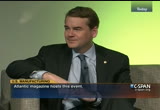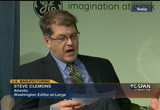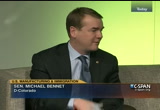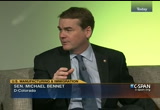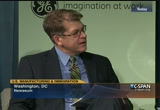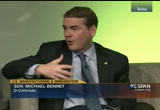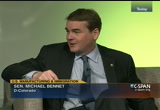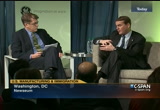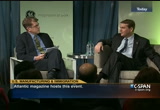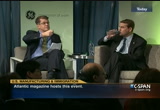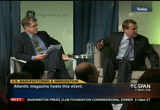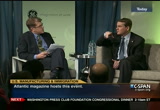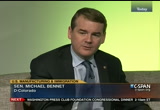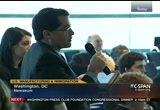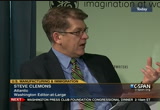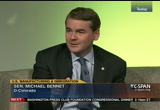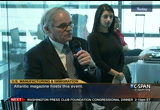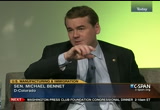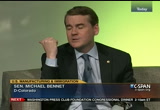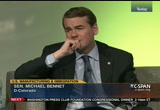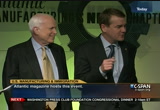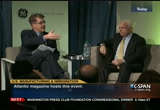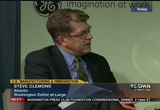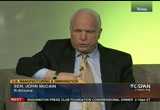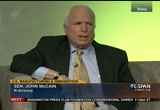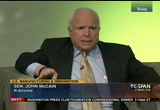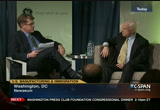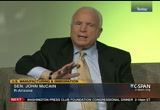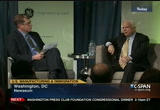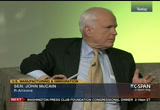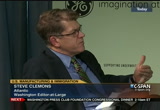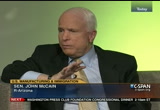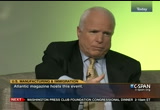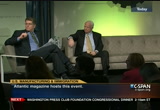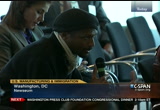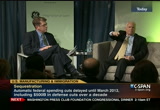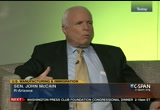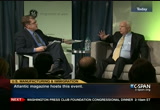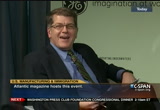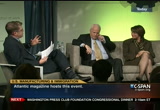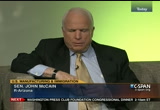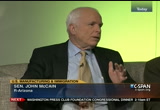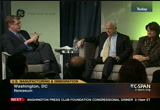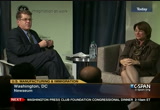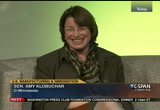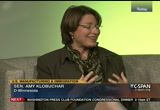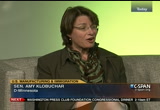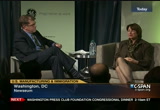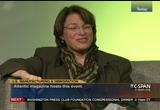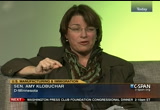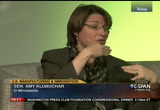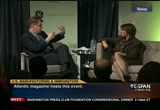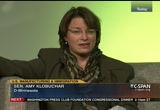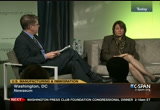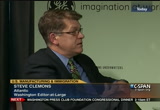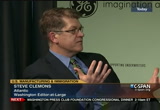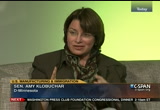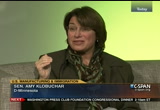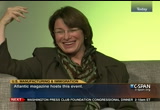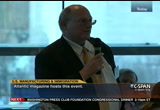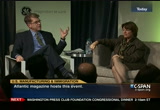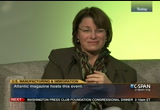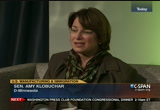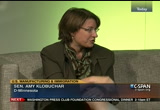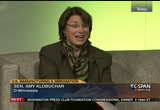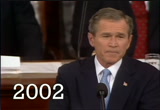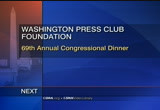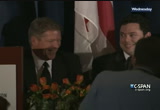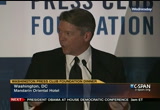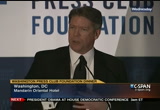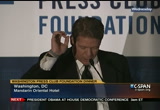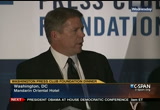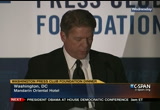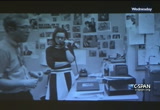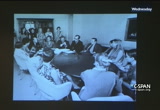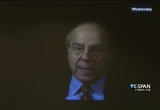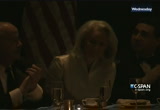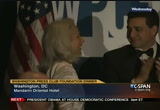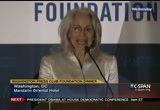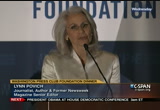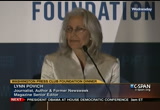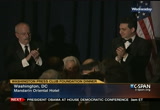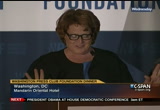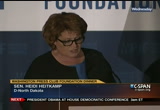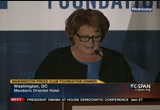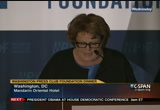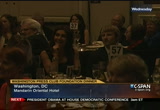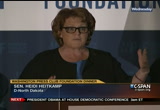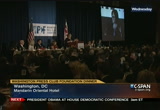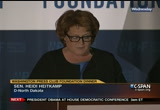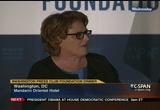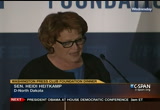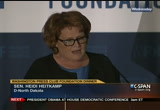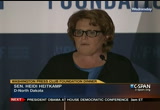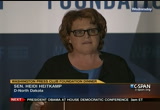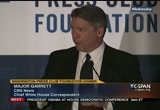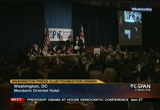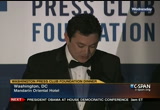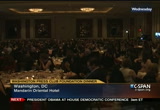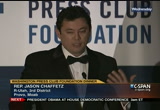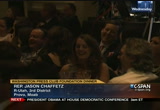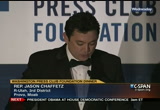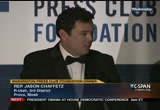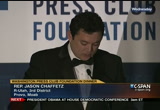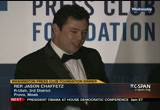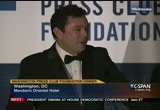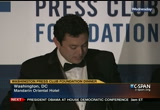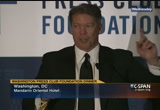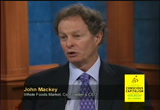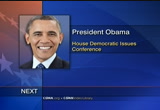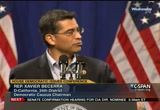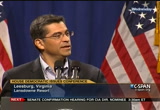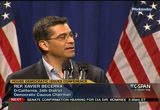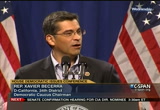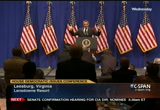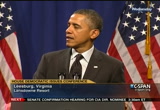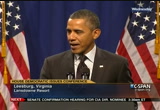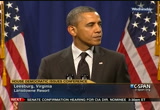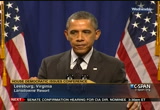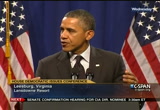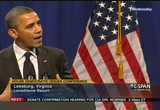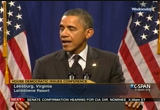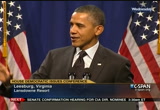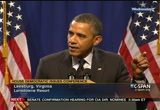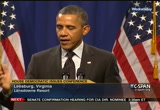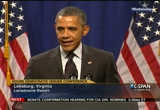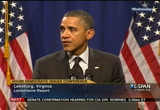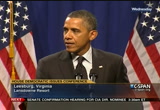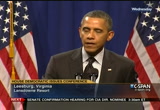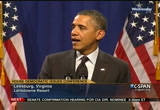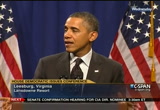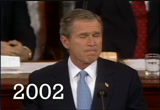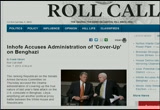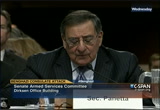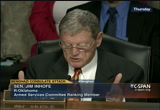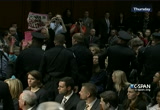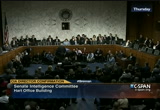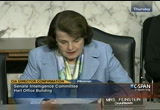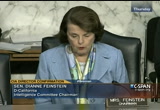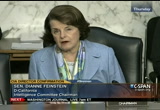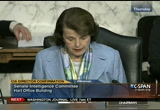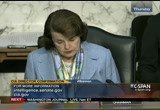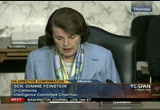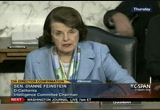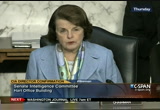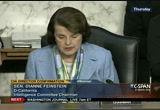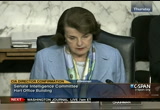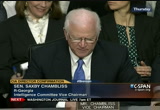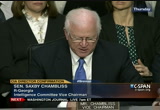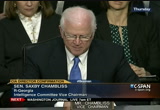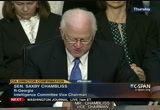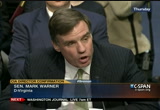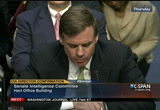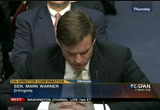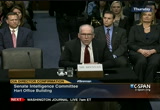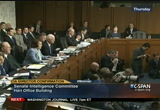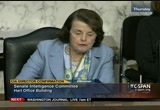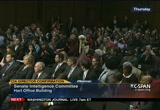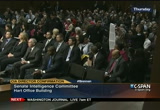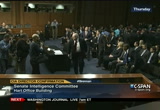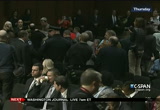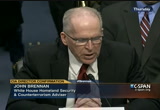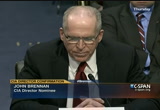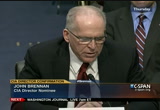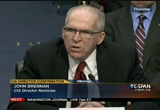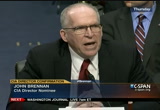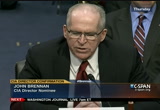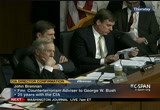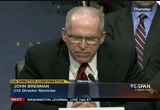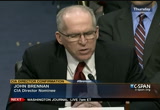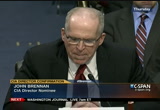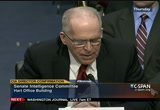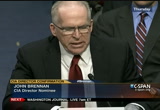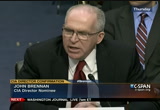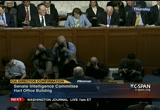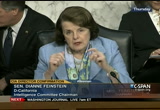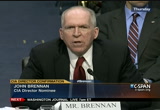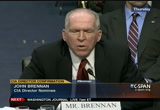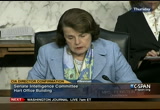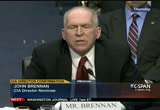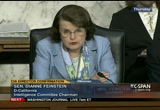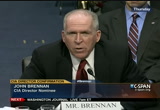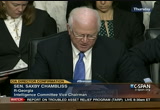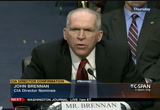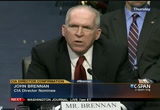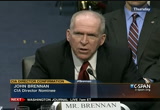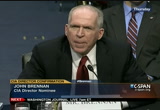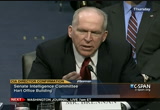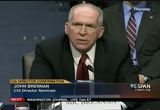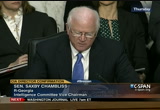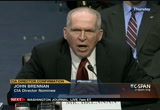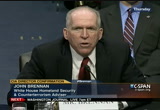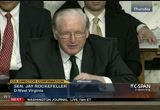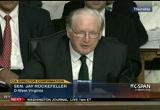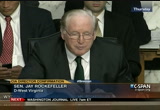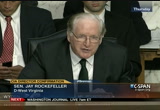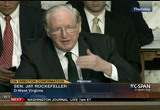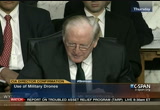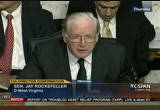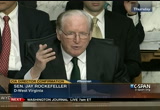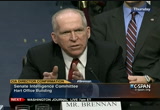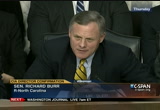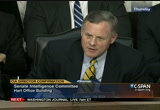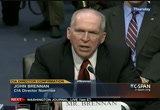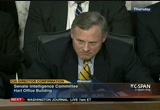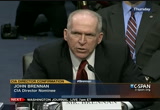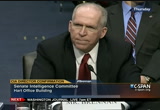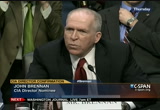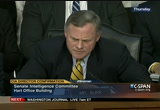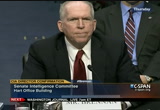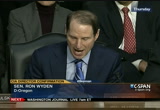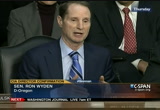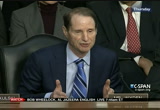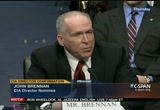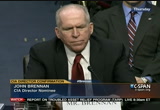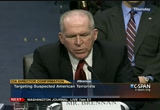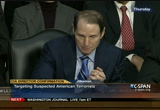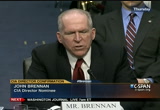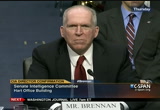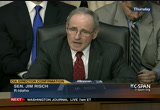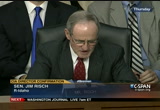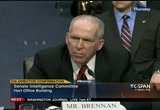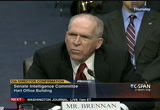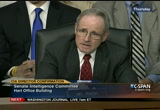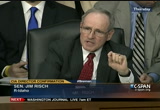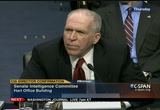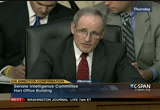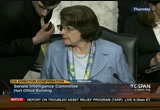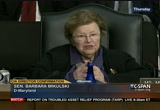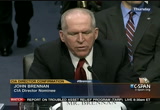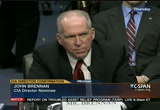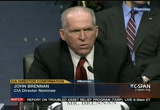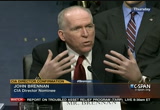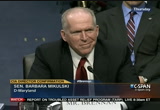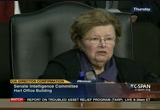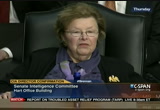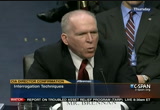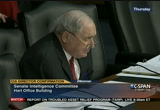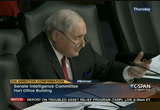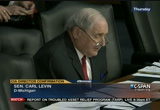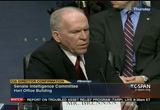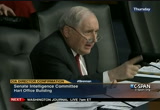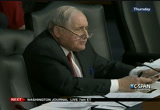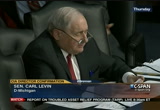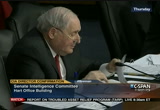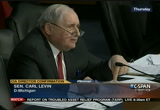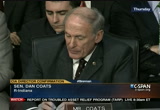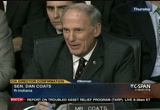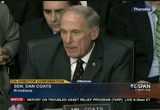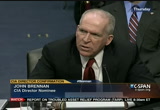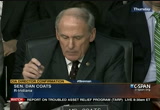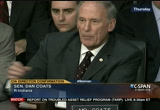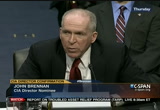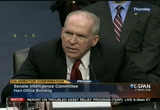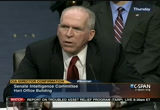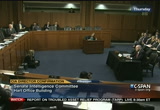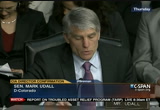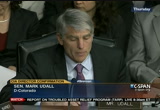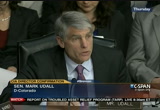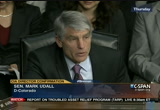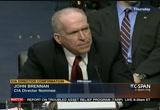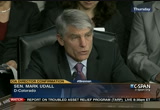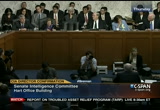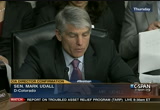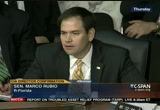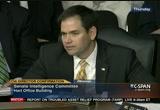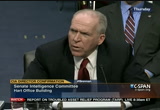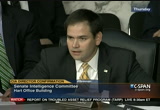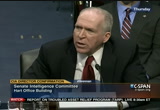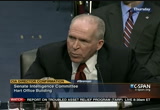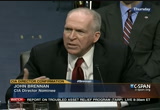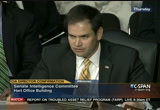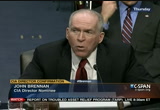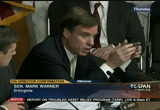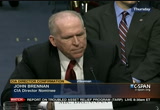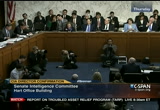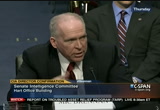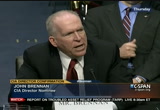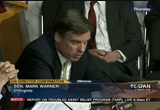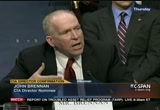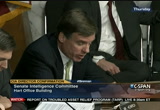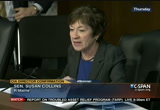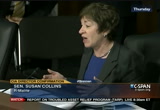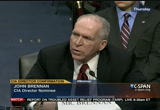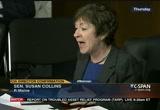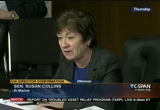tv Capitol Hill Hearings CSPAN February 8, 2013 1:00am-6:00am EST
1:00 am
this is just over an hour. >> i am editor at large of "the atlanta." special greetings to folks watching live on c-span. you are probably not on live c- span very much. >> i am on lives c-span every now and then. one of my daughters was watching the preside once at the senate. after i was done, i got a call from her and she said, i can be a senator, because i can say "without objection." >> there is one bit of a tax -- of disclosure. michael bennett, senator from colorado, happens to be a brother of our editor in chief, james bennett. you would think that would be great access, but it is a hurdle. they do not dislike each other,
1:01 am
but they are so careful about not mingling interests of what got you here today was the talk about immigration. i thought about getting all of you together, but you have slightly different takes. you are a member of the group of eight. maybe it is not a group of 7.5, depending how senator menendez is doing. >> we will see. >> in the question of how the white house -- even today, the president said at the democratic house retreat that he is heartened by democrats and republicans both seem to take this seriously. politics may not be easy. there are regional variations in the country. there is youth and dynamism. i love you in your group of eight role. also sharing your work with the
1:02 am
colorado compact. talk about the michael bennett vision of what we need to do to achieve immigration reform. >> if i can, let me take you to colorado on this issue. that is where my interest started first, as a school superintendent in denver public schools. the lack of resolution for young people who have come to this country through no fault of their own, but have no legal status and have no other country but this one -- their daily life is affected by our inability to deal with this. now that i have been in this job, he two years ago or so, as i traveled the state, everywhere in the state, the issue of immigration came up. sometimes it came up in an open session. sometimes it came up after the session was over. everybody had a very different view of the nature of the problem, but everybody shared the view that it was a problem.
1:03 am
one thing from the growers on the east slope. another thing from the cattle ranchers. another from our students. another from our high-tech community or our ski resorts. with created this opportunity to have a discussion frame around the idea of trying to produce a colorado compact. we ripped off this idea from utah, i should say, where the republican attorney general led a similar conversation. my reason for it at that time was not because i thought we were going to pass immigration reform, but because i was worried that we weren't. people were saying this was really bad for business, bad for the economy. in the absence of discussion, people might begin to reality to other over this issue. just to close off this part of it, when we announced the compact, seven principles for
1:04 am
colorado, it was so bipartisan that when we read it at the press conference, the first grader was my opponent in the 2010 senate race, ken buck. which gives you an understanding of the notion that the immigration system is broken and that washington needs to do its job, which was the first principle. >> how much you hang out with ken buck? last time i saw you, you were drinking beer to the other. is that the colorado tradition? >> i spent a lot of time trying to find things i can do in a bipartisan way. >> this was at the presidential debates in denver. we have a party with your opponent, jointly, drinking beer. >> now, you flash forward to what is going on in washington.
1:05 am
it does appear that we have the opportunity, i think, this summer, to pass a broad based bill that deals not just with one problem, but actually takes on the entire array of ways in which this touches and concerns of our economy. i give my democratic colleagues a lot of credit. we do not call it the game of eight -- gang of eight, because john mccain does not like that term. it is the group of eight. i give him a huge credit for his work, and marco rubio, and lindsey gramm, and jeff like. this might not just be an opportunity to fix immigration, which would be huge, but an opportunity for us to demonstrate to the country that finally we can do something that is hard, and we can do it in a bipartisan way. >> when you think about it and you stepped out these principles, including finding a track for citizens to get legal
1:06 am
-- but you bump them back behind those that are there. i have read through them. but what point, when you get into deeper specifics -- i have read through the colorado compact and what the group of eight have put on the table. it reads as principals. it does not read specifically. when do you begin losing the bipartisan flamboyance? >> there will be bumps in the road. it will not be an easy thing to do. if it worries you -- were easy to do, it would have been done a long time ago. there are parties ready to get this done, who have heard from home the same things i am hearing. i think we have momentum and need to keep pushing. the principles we enunciated are much more specific. the notion with the colorado complex is similar to what we did when i went in a superintendent, which was to go
1:07 am
around and try to get people to agree that we were all going to act, no matter how we were involved in the project of educating our kids -- we were going to put our kids first. that sounds like obstruction, but when you are in the hard work of having to close schools, it gives you an ability to remind people of what the interest of kids.ch is acting in whether it is our compact or whether it is here, particularly here, because of the detailed nature, it does give us a road map. and i think it holds together. employer verification, a path to citizenship, making sure we are not rejecting talented people from other countries that have a ph.d. is and a real contribution to make here, and so on all of these things, in a substantive way, hang together. but the politically hang together. over years of debates on
1:08 am
immigration reform, it has been clear what the component pieces are that are necessary for a large deal. i can filibuster all day long, but i do think colorado, in some sense, it is unusual, maybe. we seem to -- the ski resorts of mentioned earlier -- a huge number of moving pieces. >> part of politics is put yourselves in the shoes of your opposition. you have people like rick santorum, that have been very dismissive of this attempt. do you see any valid points they have raised, in terms of their opposition to moving forward? i am going to ask john mccain the same question. >> some people are better at putting people in other people's shoes and other people. to be polite. it is a virtue to do it.
1:09 am
all we do not do a lot of it around here. there are people i have worked with for many years to come in education, for example, who believe we should have a path to citizenship that is not in any way contingent with securing the border. i met with a number of them last week. one of the things i said was, i know we believe that, but there are people who do believe it is important for it to be contingent. i think we have to balance in this proposal. the legislative language strike that balance very well. >> i would like to open the door for comments and questions. we will hold the microphone over to you. if not, i will filibuster. >> had all been, from the
1:10 am
council on foreign relations. -- ted alden, from the council on foreign relations. as the country, we are far down the road on border security, but not work places. >> it is a good question for john mccain when he gets here. seriously. that is a very good question. of course, work for security or verification is a significant part of this deal. i suppose it is contingent, in the sense the deal will not be done unless this is part of it. the sequence in time may be different. it may have to do with the substantial amount of investment that has already been done on border security. one of the things we need to understand is, we have already done a lot. there is more to do, but we have done a lot. we should recognize that. for the first time in a long time, a net outflow, which is some of what has given us the
1:11 am
opportunity to have this discussion we have got. i am not dodging the question. i am simply referring it to somebody who is in a better position to answer it. >> that is a former colleague of mine at "the new america's foundation wrote a book about demographic change, arguing that in mexico and other south american countries, the aging rate is happening so rapidly the perspective we have of people wanting to get over the border -- you will build a massive border facility. the problem is really that we are not attracting enough people. he will not have as many people. the economic problems here -- a lot of people move southward. has this entered the debate at all, the fact that we may be outfitting ourselves for a trend that disappears? >> i think you are thinking longer-term then we tend to
1:12 am
think. it is important for us, whether we are talking about this issue or our deficit issue, to understand the demographic changes that are happening in and around the country. it is also the case -- i know you have been talking about manufacturing. we have a lot of jobs in this country that are unfilled. as a former superintendent of schools, i can tell you that my first priority is that we have to fill those jobs here. we are doing a horrendous job of preparing people for the stem fields that are required to make sure this country actually leads the world in advanced manufacturing. there is so much more we can do. we have not begun to do what we need to do for kids in this country to be ready for the 21st century. while we do that, it seems to me that it makes no sense for us to be saying to people that have
1:13 am
acquired advanced degrees here and our foreign nationals, whose education we subsidized, but for a answer, because of obsolete caps that do not make sense, if that that ought to go build a business to compete with people in the united states. we need those folks here, to be able to drive innovation here. >> senator rubio is going to be addressing the republican side after the state of the union address. one of the comments was that he was going to address the nation in spanish, which is great, but i am wondering -- the language was an issue, last time i checked. how is that going to be perceived? >> the requirement that there be english? >> that if you are legalized, you have to speak english. >> i think that people are -- i think it is understandable that
1:14 am
we would have a requirement. i think people are willing to do that, to make that trade in order to acquire citizenship. by the way, not citizenship only in this context, but also lawful status in the united states so the town worked as their weight in that line to become citizens. >> i imagine there is good to be a saturday night live sketch of president obama reading the state of the union address in spanish. >> i saw a clip here the other night of chuck schumer, dubbed in spanish. somebody said he sounded better. >> i do not know if you know bob pastor, an assistant secretary of state, close to jimmy carter. he wrote in the l.a. times this week, saying that biometric id cards could help with the voter fraud issue, he getting out of this constant challenge in of people at polls, but also how
1:15 am
with workplace and identification. >> i cannot speak to it for voting, because i have not looked to it yet. is in the mix. >> i always get more than a bargain for. i wish i could say i was going to read this on the way home tonight, but i am not going home. >> it is in our proposal with respect to employee verification. there is a lot of sensitivity around this issue. the way we have designed this, there would not be a central database with people's information. the information will reside on that card, just as the intermission of your printed social security card reside on that card. this is just an electronic, fraud version of a social security card.
1:16 am
i was going to see if i had it. >> i do not know if c-span can zero in. >> i am sorry. it does not matter. >> right here. >> you brought up the issue of needing to educate young people in the manufacturing field, and yet it seems that the last 25 years has had so much emphasis in high schools about preparing people for college. coming from an education background, this is probably a subject you would be well versed to address. many high school classes that used to be geared toward manufacturing, such as shoppin - everybody is supposed to be college bound. the first introduction to manufacturing used to be in those shop pclasses. how do we we direct the secondary education system back
1:17 am
into the basic manufacturing trades, which are now perhaps even more lucrative to graduates than going to college? >> first, while i agree with you that there has been an emphasis on having kids go and complete college, we have been highly unsuccessful at doing that. if you were born poor in this country, and are living in a zip code of poverty, your chances of getting a college degree are nine in 100. that means that 91 out of 100 kids do not ever get a chance to decide whether they are going to get a college degree. the that is an outrage. when george bush jr., became president, we lead the world in production of college graduates. today, we are 16th in the world. if it turns into a waste of a
1:18 am
month or a year, there is no statistics carrier to me than that, in terms of why we have to get our politics right. i will not give up on the idea that we should be doing a much better job preparing people for college. having said that, and also agree we need to do a much better job preparing kids for careers. when i met with the college presidents or the carpenters union,, i would hear much the same thing from both of them about the quality of the math skills, for example, that our students said. there is a lot of similarity in terms of skills and knowledge. we do have to think differently about how we organize ourselves around these multiple pathways for students. we were having a hearing today where i asked some panelists about this. just because washington, d.c. thinks about early childhood as one thing and k-well as
1:19 am
something else and vocational and something else does not mean that is how we actually approach these things as human beings. acquiring skills and knowledge for a lifetime of productive work. what that boils down to is being able to have exposure to somebody -- somebody at the hearing today was talking about a program in brooklyn that ibm is doing that exposes kids to work at ibm, so when they finish, they have not just a high-school diploma, but also whether advanced degree required for certification to have one of those jobs that ibm. that is not a natural byproduct of the system we have designed, but it does not mean we could not design a system that would do a better job of doing it. there was a time in our history when the vocational classes or for kids we believe could not hack it in the academic classes.
1:20 am
as a result, there river was not what it should have been. we should not go back to that either. [applause] tough living. >> we are doing one after another. >> the story of my entire life. white, just did a rowboat call for a candidate in colorado who was running against my friend, michael bennett. his 5-year-old daughter walked into the living room and said, why does john mccain hate you? >> the other half of the story is, when i first came to the senate and they said, you can have a mentor, and i asked for john mccain, john mccain came to the floor and said, i will take you to lunch, young man. i told my daughters this great
1:21 am
hero was my mentor. the could not have been happier. then, when they heard this robo call, it broke their hearts. i told them he did not really mean it. >> at the swearing in, i would also like to point out i invited his lovely wife and daughters to come to my office and said my object apologies. -- abject apologies. >> goodbye, everyone. thank you. >> senator, nothing has embarrassed me more. daddy, why does john mccain hate you? that is tough. he is a great guy. >> you were in denver when mitt romney and barack obama were debating. michael was hosting a beer bash downtown with ken bock, for whom
1:22 am
you did the robo call. they seem to be doing ok. john mccain, a former candidate for president of the united but the states. >> loser. >> and we are here to talk about benghazi. you have been on immigration since before it was cool. you have been battling it. i happen to be in the hagel hearings, and you talked about the iraq surged and needing one vote. i remember the mccain-kennedy immigration reform vote when you needed a last vote, and it did not come. you have been struggling along time about the future face of the country. when to solve a lot of insoluble problems. we are back at it. i am interested in how this will play out between you and president obama. how will you get it done this time? >> i think we will.
1:23 am
by the way, and when we are doing immigration, i think of ted kennedy all the time. >> is there a ted kennedy up there today? >> no one of his stature on either side. take kenneth d. and i have gone nose to nose on the floor of the senate -- ted kennedy and i have gone nose to nose on the floor of the senate, literally, walked off, and said, "did a pretty good, didn't we?" he gave his word and he kept his word. that is not as abundant a commodity as some civics students might think. what has changed? i think a number of things have changed. we have made significant improvements on border security. that was a key issue to me. arizona is still a major drug- trafficking place in the united states of america, where drugs come across the arizona border to phoenix and are distributed all over the country.
1:24 am
there are still coyotes' keeping people in drop houses in phoenix under unspeakable conditions. but we have made significant improvements, and we know how to make enough improvements that i think you could have operational control over the border, using a lot of equipment we learned in iraq and afghanistan for surveillance and apprehension. i am confident we can get the border secured. what else has changed? how elections. let us have a little straight talk. we see a rising demographic from america with a receding number of votes for the republican party. it is fact. to deny that who would just be unfair to any audience. i think that has changed. third, there is a realization around america, maybe there should have been long ago, that we cannot leave 11 million
1:25 am
people in the shuttle's forever. the people we trust, who washed our lawns and -- to cut our lawns and wash our dishes, is it right to leave them in the shadows forever, 11 million people at the risk of being deported forever? i don't think so. i see polling data. americans are much more favorably inclined on that issue, to give them a legal status and a half to citizenship. by the way, that path to citizenship will not be easy. a lot of advocates for hispanic organizations will not be happy about how tough it is. but everybody who came in this room has probably broken a law, whether there were caught or not. if you work, you paid a penalty and moved on. you are not permanently penalized for breaking the law. the climate has changed. american opinion has changed.
1:26 am
elections have changed. we still have people who are adamantly opposed, but i am guardedly confident, and i am working with people who are effective. chuck schumer is effective. i hate him, but he is effective. >> i am sure that just went out on twitter. definitely under 140 spaces. >> dick durbin is effective. marco rubio is effective. lindsey gramm has been in this thing almost as long as i have. he is effective. all of the people engaged in these negotiations have the respect, i think, of their colleagues. >> when you and lindsey gramm were here in november, mitt romney had just watched -- lost the election. he said, it is one thing to get hit by a fast-moving train. it is another thing to get knocked off the road by a slow-
1:27 am
moving bus. pawlenty gramm was so candid about the mistakes the gop made, and was clearly advocating this line of thinking. when you look at political commentary coming out from the gop, they seem to be unaware of the things you and lindsey gramm work. how big a divide is there between the perspective of what it will take to save the republican party and connect with this new crowd of voters? >> i think it is a number of things we have to do. one of them fundamentally. but they are things we can before rather than be against. now other than being against the deficit. against the things president obama is trying to do on taxes. we have to be four things. we have to explain to people that cutting spending is but for for our economy, not just cutting spending.
1:28 am
americans are different from my generation. they have different philosophies, different ways they approach their challenges and issues in life. we better become attuned to them. when you look at the demographics and the racial component of our base, we think the results are obvious, of what the future holds. one of the most successful periods of the republican party was one we had a contract with america. it was 1992. we told the american people that if they gave us the majority, we would do the following 10 things. we need another contract with america, a positive agenda of how we can help entrepreneurs, how we can help young people get an education, how we can do the things necessary to create an
1:29 am
environment for small businesses to flourish. and commit to that agenda. then, if the people are kind enough to give us a majority, inactive. we have to be four things rather than against. it does not help to be against obama. >> does it cause you grief? i was listening to the afl-cio folks earlier today. there are a lot of components of immigration reform that you are on completely the same page together. i think that gives ted crews heartburn. but you are fine with that, it seems. >> we have a tough negotiations ahead of us. one of the toughest parts that we have not resolved is this whole issue of the guest workers. high-tech workers, no problem. somebody has a ph.d. from mit, he want to stay, god bless you. but when we get into agricultural jobs and low-
1:30 am
skilled workers, the devil is in the details. under what conditions can we have a low-skilled worker who is not a resident citizen in this country, and work? that is a really tough issue between us and the unions. we have good negotiators. we are result oriented. i am guardedly -- let me put it this way. i am more optimistic than i have ever been. but there is still tough bargaining ahead. >> we have a me -- amy kl obuchar coming in afterward. they have a bill that removes country caps and expands the h1- b program. when you talk to firms very broadly about this, and the fact that we have a lot of smart, talented people that come into american universities, and we
1:31 am
send them back out, and that is probably not the best economic policy, -- others are raised the point as well. when i worked in the senate ages ago, we were talking about the skills gap for workers. why is this country so bad, it seems, at connecting the work force we have out there to the millions of jobs here? what is missing, in terms of getting that equation at least more right than we have over two decades? >> first of all, despite the fact that i disparage amy all the time and say the people of minnesota made a terrible mistake reelecting her, could i just say, she is really smart on this. she is going to give you a better answer than i am. she has really done great work on this issue. she has a constituency of some major corporations that she really understands the issues.
1:32 am
she will give you a better answer and i will. i think a fundamental of this is, there are jobs in the united states of america for highly qualified scientists, science, math, except for graduates that we want to keep in this country. we ought to find a way to make that happen. it is a lot more complicated than that. in some ways, it is not much more complicated. there are thousands of jobs for people with a level of education. 25,000 chinese students are in this country, taking hire scientific education programs. something like that. if that person wants to stay and work in the united states of america, and there is a crying need for people with those skills and education, let them stay. we can do it on a temporary basis. we can work out the details of how we could do that.
1:33 am
>> let me open it up for questions. make sure, because we do not have much time. >> by the way, after i lost, i slept like a baby. sleep two hours, with up crying. sleep two hours, wake up crying. >> in terms of your immigration bill, what are you doing about the kids who came? they were dragged along. >> the dreamers. we will have provision for the dreamers to have a rapid path to citizenship. they were brought here as children. the fact is, they are in a special category. >> right here. >> steve. i worked in the news business and study here in the city. thank you, senator.
1:34 am
do john mccain and barack obama finally see eye to eye on a piece of legislation? second question -- >> can i answer the first one? >> you and the president finally see eye to eye? >> we see the goal, but we have not seen the specifics of the president's proposal yet. i think he is holding off until he sees what kind of product to get out of the senate and/or the house. i think we see eye to eye on the goal. i am not sure whether we see eye to eye on some of the particulars. >> you, your father, and your son have served in the military. can you comment on the secretary of defense remarks yesterday about the pay cuts? -- pay cuts for troops, regarding sequestration? >> sablan republicans. i blame democrats for ever coming to such a conclusion.
1:35 am
i am a great admirer of secretary panetta. the great national security background. as you may remember, he was chairman of the budget committee in the house. he has a better handle on those issues than any other person. he is beside himself. he says shame on the congress. shame on all of us. there is absolutely no future and no particular -- and no future for defense contractors, waiting to see if we are going to go over another cliff. it is insane. in case you missed it, there was a favorability rating among or so ago. --a moth or so ago. did you know the, favorability of congress was the one below a
1:36 am
colonoscopy? we deserve it. having said that, please have the president called us over to the white house, and sit down and try to solve this. can't we come to the white house and sit down and ellis' try that? what do we need to do? what do you want, and what do we want, and what is necessary? general them seem mentioned this morning in a hearing. we just cancel deployment of an aircraft carrier going to the middle east. the and know what the sailors do? they have canceled the lease on their home. the have gotten rid of their car. the have made all the preparations for being gone for many months. now, they are staying there. why would we do this for these people? because of our ineptitude? it is disgraceful. strong letter to follow. >> on this question, of you and
1:37 am
obama, some have said that border security and word that fits in -- if i did not misunderstand you, you basically described border security as a check off box. one of my blog readers -- the senator would occasionally read my blog. thank you for that. when sent this note he had published in the national post. he said, we have been at this. this was from may and austin. there are 11 million immigrants. where do say the investments are largely there and the situation is better? is that a done deal, or is there much more the would need to be done? and is that a dividing line between you and the white house backs >> i do not know about the position of the white house. i do know we have made significant improvements. there are more improvements to
1:38 am
be made, particularly in the area of technology that has been developed in iraq and afghanistan, in ability to surveil and apprehend, whether we are talking about drones or satellites. in a few months, down on the arizona border, the temperature will be 120 degrees. it is hard on people. it is hard for people to remain efficient during those conditions. the more technology and surveillance capacity you have, the less wear and tear on these brave men and women patrolling our border. we can do that. but it is coined to take a while. [indiscernible] [laughter] >> did you hear senator mccain said he was so sorry you got
1:39 am
reelected? one thing i wanted to finish up with is, we are here talking about manufacturing's next chapter. there seems to be a new spring in the step of talking about manufacturing, that there are new technological breakthroughs happening. there are a lot of problems. the last 10, 15 years, i cannot remember manufacturing conferences that were not more doom and gloom. the you get the sense we are turning a corner in the country? i imagine it is not because of the great vision coming out of capitol hill. i am interested in how you see the manufacturing future of the country, and what you see happening in the economy right now. >> i come from one of the hardest-hit states because of
1:40 am
the housing situation. at one time, more than half the homes in arizona were under water. i always said it was a housing crisis that started this thing, and a recovery in housing would be a sign we are coming out. that is really good news. natural-gas and fracking, amy and i would agree that within 10 years, we are going to be energy independent. can you imagine how that changes our national security priorities? i think that's what businesses are starting to feel better. -- i think that small businesses are starting to feel better. i think the deficit and debt are the long term crisis we need to address. short-term, i am more optimistic than i was a year or so ago. i believe this is the most entrepreneurial, best nation in the world still for invention
1:41 am
and innovation. that is why they were invented here. unfortunately, they are made someplace else, but they were invented here. this has changed the world. i spent so much time in the middle east. i can tell you that social networking has not only changed the middle east, but it will change china. it would change russia. and it has changed our lives. i cannot tell you the changes. we had this conversation a little over two years ago. mubarak is in power. gaddafi is in power. there is no uprising in syria. what you think the world is going to be like two to three years from now? not only is senator klobuchar one the hardest working members of the senate, she is one of the most pleasant to be around. she takes my insults and other barbs with a great deal of good
1:42 am
humor, and i enjoy being with her. >> the term mccain standing up like this on immigration is going to make all the difference. we are excited about what is going on. whenever you travel with him as a woman in the foreign country, and, and it is all guys in power, he makes sure he says this woman is a senator of the state of minnesota. he is a great guy. >> ladies and gentleman, a quick word about john mccain. we are talking today about how immigration. over the years, i have seen senator mccain talk about -- detail. i have been with him when he was steaming on campaign finance, and went to the house to drag people into any action of looking at public interest responsibilities of broadcasters, to and a lot of corruption on the money side of politics. whether it is national-security issues -- and we often talk
1:43 am
about him being a hero because of his military service. after seeing the senate, there is a lot of passive legislative stuff, where people do not take responsibility for what they do. it is a real honor to have you with us today. >> i came through the phoenix airport. the guy runs up to me and says, did anybody ever tell you you look a lot like senator john mccain? sometimes makes you mad as hell? [applause] >> how are you. good to see you. we have been having a fun time. sort of a lightning round. we had michael bennett here a bit earlier. it has been a day. everybody deserves a medal for having gone to a marathon, starting a marathon and running all day about this topic of
1:44 am
manufacturing. you basically said, there is a gap in the system, where we are not really grabbing the smart, brightest people. to some degree, the american story is being a brain drain for the rest of the world. you bring smart people here. you keep them and they invest. it is controversial. some people believe that might, displaced workers. you have moved forward in the immigration act of 2013. your best pal is orrin hatch, marco rubio, and chris coons. you definitely have the geographic span going. >> senator hatch and i are leading the bill. it came together when washingtonian magazine voted us the senator is least likely to be in a scandal. that is sad but true. we do have that in common. the other thing we have in common is that brought us together on this bill was truly
1:45 am
our belief that we need a competitive agenda for this country, that we need to move forward in this country. the way we do this is to be a country that makes stuff again, that exports to the world. while our financial sector in minnesota is incredibly important, that cannot be the basis for our economy. i have seen the positive of this first hand in my state. we are down to 5.6% unemployment. while it is not perfect, one of the reasons we are doing better than the rest of the country is, we have this innovation in manufacturing. we have companies like 3m and medtronic. we have the biggest private company. we always believed that science and engineering is at its base in our economy. we brought the world everything from the pacemaker to the post- it note. how do we extend that to the
1:46 am
rest of the country, and expanded for minnesota as well? i have come up with an export that is pretty obvious. but making sure that is expanded to small and medium-sized business, where 90% of our customers are outside of our borders, bringing the debt down so that investors have confidence in our country and we can move forward. 3, that we do something on rules and regulation. i could talk about vises that would make a big difference. a lot of our topic today is, we have the work force we need, and the world's talent. that is how we have always gotten the way we want to go. part of it is training workers for today and tomorrow. another part is opening our doors to people in other countries. 30% of u.s. nobel laureates
1:47 am
haar -- are foriegn-born. we have unlimited caps for the sports stars. minnesota has not had the best years, but we love our teams. nfl hockey teams, over 50% of their players come from other countries. mostly canada. it is unlimited. so we do that. but what do we do with our engineers and scientists? we have a 65,000 cap right now for a visa. that is 1/3 of what we had in 2001. have we have gone down who in what we are allowing in our country and in our workplaces. and we are basically training our competitors. people are coming in, getting degrees in our universities. if they do not have a job or an
1:48 am
ability to get a green card, we sent them back to india to start the next kugel. >> the fair criticism of that is -- i get the logic of bringing smart, talented people to the country, keeping them here, and having them in the mill you of the united states. -- milieu of the united states. why are we so bad and getting our talent into those jobs? we have been talking about this for 20 years or more, and we seem to have done a miserably bad job. we import those people instead of transforming ourselves. that is the question john mccain asked me to ask you. >> what else did he say? i do think that we are seeing improvement. in my state, more and more people are going into the finance and technology.
1:49 am
i have seen those school science bears. something we never did in high school. you see 16 year olds competing with their experience. -- experiments. in addition to training our own workers and making that a huge priority -- it is not just advanced degrees. it is to year degrees in technology that are important. 20% of the jobs openings right now -- the president gave us a statistic that our retreat yesterday. jobs are open in the technology sector. "we have always had a combination of training our own and opening our doors to others. our response to this argument is, what is happening right now is we do not allow people in, and we are contract and out with them in other countries. then, when they hire their research assistant, that person
1:50 am
is french. i know someone in minnesota who did not get their application in time. the cap of vises got filled. the contract it out. mayor bloomberg and mayor castro commissioned a study. for every h1-b visa we have, it generates to jobs in america because of the people they hire. if you look at the numbers, we create more jobs when we have scientists and engineers. of the same time, simultaneously, we have to train people. what this bill does is, here it says we are going to at the same time raise the cap from 65,000 to about 165,000 in the first year. and then we are going to have an escalator of 20,000 year until
1:51 am
we reached 300,000. that is the bill as we proposed it right now. at the same time, here is going to be an increase for each of the sahara application, and that will be used for stem training in our own schools. at a minimum, it is $3 billion in 10 years. it could be as much as $5 billion in 10 years. we have gotten that by combining educating our own students with making it easier to bring in some of these best and the brightest. >> if i told you who i have looked at your bill, and what is interesting about the bipartisan support is the likelihood of bipartisan opposition. john mccain is probably going to have to stare down ted cruz.
1:52 am
all you have to stare down in your own ranks? >> it is complicated to explain. we came up with a cool name, in edition -- i-squared. part of it is making it very clear that when you look at the numbers, it means more jobs in america, and that we are doing things to train workers on the same jobs. >> you are not going to talk about who? >> we will have no critics. i am kidding. you do not want to make critics would you do not have them. the president actually mentioned this part of immigration reform. he mentioned the path to citizenship and all the other things you probably talked about today that are being worked on with the gang of eight. senator rubio when i feel very
1:53 am
strongly about this. it will be included in the overall bill. it will generate a different kind of support. we believe it should be part of the overall bill. >> we just had the deputy director of ostp, one of the smartest guys in washington. he seems like columbo and seems kind of bumbling sometimes, but he is very smart on these issues. he told me the administration supports removing the country caps. they support a kind of entrepreneurial start-ups visa, so that entrepreneurs that come here -- >> that will probably be a separate bill. >> and there was another element of this. but it seems aligned with the core components. it seems to are already moving along. >> we are building support, working with them. we have been focused on the h1-
1:54 am
b's, but there is green card reform as well, changing the country caps and literally stapling a green card to a diploma for an advanced degree holders, something we do not do enough. >> i cannot see you guys over there. >> i thought it was a green card. >> i do not need one yet. i do want to ask one question. one of the reasons i was so committed to today's discussion in this conference and you and i have talked about this is, i have this -- an experience a few years ago. three back-to-back talks. one was with christine lagarde. now, she is the head of the imf, but before, she was the science minister off for france. we had obama's heck officer, saying we had a tech crisis in universities. because of 9/11, we were
1:55 am
blocking talented people from coming into the country. it did not matter whether there were tourists. nobody wanted to take risks with people coming into the country. the state department denied this was happening. in fact, there were large rejection rates. the next night, i happened to be at a thing with john ashcroft, who was then attorney general. i said, the president's science advisers said this is a crisis. he said, it will take a seven rate years to sort out. we did not have the technology or methodology to screen good people from bed, and there were too many disincentives to bring people in. it is kind of like the larry lindsey comment that war's cost hundreds of billions of dollars. there were people who understand the trade-offs. the following night, the ceo of intel reported who these comments and said, if we do not fix this in six or seven months,
1:56 am
we lose the cycle of talent coming into the country, and we will be forced to invest in r&d facilities abroad. who you think the united states is finally getting passed its -- past its terrorism fear caused keeping people out? are we turning the corner? does this mean america is unclenching a little bit, becoming more comfortable with people coming back? >> i do nothing we can ever say we should not be afraid of terrorism. it is still there. but our intelligence gathering is better. there can always be something that goes wrong. but we have gotten to the point where we need to take the security lessons we have learned, keep that in place, and design a system which will allow people who are not close to
1:57 am
being terrorists into our country. i would agree there has been a sea change in terms of people realizing -- let me use the example of tourism to support what your saying. we have lost 16% of the international tourism market since 9/11. it is not because of the economy. it was our piece of the pie that we lost, that went to indonesia, france, england. we are in the process of gaining it back, and it is a good thing. we are seeing a rise in international tourism in this country. every point we gain back is 160,000 jobs in america. they are tourism jobs. they cannot go anywhere else. we can keep all the security measures we put in place. but let us put, the officers were the demand is. why was it taking 180 days for somebody in shanghai to get a tourist visa to come to
1:58 am
america, and only 10 days to go to england? the state department undersecretary clinton, which will be continued -- i talked at length about this with secretary perry -- kerry. we need to put the officers were the demand is. they are profit centers because of the visa fees where the jobs in america. that is an example of what we can do better, in terms of changes that can be made without even passing legislation. i think that is what ashcroft was getting at. >> that is an easy 2 million jobs with the 16% black. >> that is the easiest low hanging fruit for exports. the biggest chunk of that, in addition to agriculture equipment for minnesota, and medical devices, will be tourism. >> we have arthur and eric. the microphone.
1:59 am
>> i want to confirm the numbers. right now, we have 65,000 h1-b visas allowed under this cap. our bill puts at about 115,000 the first year. we escalate up to 300 dozen. that is what the numbers are. -- come up to 300,000. that is what the numbers are. >> my name is eric watkins. i have a question about temporarily agriculture workers. back in the late 1950's, a work shoulder to shoulder with bracero workers. hard working. very honest. even though the program did not allow families to come, they did. these hard-working men had their wives and children with them. does the current conception of legislation for temporary i recall co-workers provide for families to join these men in
2:00 am
the field? secondly, is there a provision i know that my neighbor -- i always like to say dianne feinstein is my neighbor, but i point out it is at work. she works in the offices as opposed to home. she works next to me, and she is working very hard on that piece of the bill, and knows very well what you are talking about representing the state of california. working with senator rubio and others on that bill. i know they are in the middle of negotiations so i do not want to put words in her mouth, but i know that the family concern is a piece. >> it is interesting that the afl-cio have a very proactive, progressive position on this and are out advertising and moving that now. i asked senator mccain. he said, they are in exactly the
2:01 am
same place. this is important. it is a larger picture where seemingly fighting pieces, kennedy and others with his early legislation, there is more goodwill to try to move this forward. >> it would be in a bigger bill. i think it is a good thing we have these two bills that are arguably complicated but do separate things. the agriculture workers and the one with senator hatch, the expert bill. they are completely related to the immigration issue. it is good we will get the language done on those bills, because they have been traditionally very complex areas. that is part of why we are proceeding in this way. >> you touched on tourism being a issue. there has been no greater champion than yourself and senator mikulski. the waiver program extension. is there appetite to get this
2:02 am
thing done. do we link this up with immigration -- can we get it done next year? >> about visa waivers. we look at each country on a case-by-case basis. poland i know. i just met with the polish foreign minister. the act is our bill that i had with senator schumer leading up, senator rubio and i and a group of eight senators introduced it last year. we would hope because it is in the judiciary committee that it is something we could put on this immigration bill. because of that broad support. a number of provisions for places like poland, related to making tourism easier. when you look at the growing middle class in these countries that want to visit america -- at my hearing, they showed a
2:03 am
tape from brazil. their version of "good morning america" -- it showed people in line trying to get tourist visas to come to america, sleeping on the sidewalk for days because we did not have enough. now we are building -- they are profit centers because of visa fees paid. >> i have been told to stop. we will take these two last questions fast. >> thank you. my question is, i think the immigration thing is perfect, but would you have a consideration about other things, education and infrastructure? >> let me take this last question here. >> from the embassy of singapore. i'm struck by the fact that when you want a student visa you disavow any intent of staying on in america. how welcoming is america in a
2:04 am
global war for talent even if they expand the? >> final thoughts? >> lets and with the bigger picture. part of this bill is for students if they get an advanced degree, they should be allowed to stay for some time and not just be sent back to singapore. senator mccain and i just met with your foreign minister, who is an incredibly smart guy. the whole idea here is that what we have been doing which is so hurtful of our own nation, training our competition at our great universities and saying, you do not have a job right now or are going to a small business that cannot get you a green card -- sorry. do you want to make the next pacemaker? you will have to go back. that is not helping us. i have heard this from laces -- the state of the union, the president of st. cloud state in minnesota, they are having trouble.
2:05 am
they have great students who are training but if they do not have jobs right away they have to go back. i am bringing him as an example for our state of why this is more than just about fortune 500 companies. this is about the fabric of our communities. i think that is a very good question and is part of why we are making changes in this bill. your question was just about everything -- thank you for bringing up education, infrastructure. this is all about the competitive agenda in the country. you see how senator mccain and i get along. there is some appetite to move ahead. the next few years in america, over there on the hill, will not just be standing alone giving a speech. it will be whether or not you are willing to stand next to someone you do not always agree with for the betterment of this country. i believe that is how we will move forward. >> as our ceo at atlantic live closes out the session, i want
2:06 am
to say a word of thanks to amy klobuchar and john mccain and michael bennet. this was a real night -- this issue is hard. the issues we talked about throughout the day are highly consequential, but what the face of the american workforce is and how to deal with issues where america has been in a self-defeating position for a long time, that is tough to move people out of their grooves. i really do appreciate -- and think you helping to make that happen. [captioning performed bynational captioning institute][captions copyright nationalcable satellite corp. 2013]>> up next, the washington press club foundation's annual congressional dinner. president obama discusses his agenda for the second term at a gathering of house democrats. then cia director nominee john brennan testifies at his confirmation hearing. >> the church is boston's most visited historical site. 500,000 people, every year. not because of our pews or are
2:07 am
incredible organ. they come here because of the even set happen -- even's that happen. what most people do not realize is what did happen in 1775 is still a genuine historical mystery. we have very few records about what actually occurred on the night that paul revere's plan was carried out in this very church. we know that there was a plan, set up ahead of time with members of the charlestown militia across the way. he set it up on sunday. but what we do not know is who helped mr. revere to carry out that plan. >> the mystery of boston's old north church plant hangers. sunday at 7:00 pm eastern and pacific on c-span three. >> having observed a steady improvement in the opportunities
2:08 am
and well-being of our citizens, i can report to you that the state of this old but youthful union is good. >> once again, in keeping with time-honored tradition i have come to report to you on the state of the union. i am pleased to report that america is much improved, and there is good reason to believe that improvement will continue to the days ahead. >> my duty tonight is to report on the state of the union. not the state of our government, but of our american community. and you set forth our responsibilities in the words of our founders, to form a more perfect union. the state of the union is strong. >> as we gather tonight, our nation is at war, our economy is in recession, and the civilized world faces unprecedented dangers, yet the state of our union has never been stronger.
2:09 am
>> it is because of our people that our future is hopeful, our journey goes forward, and the state of our union is strong. >> tuesday, president obama delivers this year's address live on c-span. preview program starting 8:00 p.m. eastern and the president had 9:00, lullaby the gop response and your reaction. tuesday night on c-span, c-span radio, and c-span.org. >> the washington press club held its congressional dinner on tuesday night. it gives politicians an opportunity to joke about washington and the media. this year these readers were republican congressman jason chaffetz and heidi had camp -- freshman senator heidi heitkamp. >> good evening again. good evening, and welcome to our
2:10 am
honored guests, members of congress, journalism colleagues, and friends. again, i am alan shearer -- n shearer, and i'm president of the washington press club foundation. this is our 69th press club dinner. [applause]it is a chance to celebrate the hard work of those in the room. journalists and those they cover, the members of congress and their hard-working staff. it is also an opportunity to remember the great winning journalists who came before us and who set standards of reporting axle and to which -- excellence to which we can all aspire. the four we did to our program
2:11 am
tonight, i would like to introduce our distinguished table. these hold off your applause until i finish the introductions. i will start at my right. julie davis of bloomberg, our foundation's secretary. terry gainer. linda povich, winner of our lifetime achievement award. david myers of cq roll call, the foundation vice president and one of our dinner cochairs. senator heidi heitkamp of north dakota, one of our speakers. our master of ceremonies, major garrett of cbs. congressman jason j fitz of utah of our speakers tonight -- chaffetz , one of our speakers tonight. senatena valentine honi,
2:12 am
parliamentarian elizabeth mcdonough, and sheila casey, the treasurer. that's give our table a round of applause. [applause] before we get to our speaker, i have a few quick thank you's. first, we are all able to enjoy this evening of wonderful food, great conversation, and great speakers thanks to the hard work of our incredible dinner committee, and in particular our dinner cochairs, christina vale ntoni and david myers. thank you, guys. [applause]and thank you to our amazing executive director, who once again performed her magic to give us this evening. i also wanted to thank the
2:13 am
foundation's sponsors and friends. their support makes the work of our foundation possible and helps us put on tonight's event. they are -- to jo to -- toyota, unitedhealth group, cq roll call, the hill, the us chamber of commerce, ford motor company, the national beer wholesalers association, the american petroleum institute, microsoft, and the newspaper association of america. thank you. thanks also to ted benson of cq roll call for providing the cover art for our program, and of course the mandarin oriental hotel and it's great staff. we have a terrific program tonight, and when it is over cq roll call will keep the fun going with a fabulous after
2:14 am
party. the band suspicious package will keep us going into the night. in six years from now, the washington press club foundation will celebrate its 100th anniversary. it began life as the women's national press club. the courageous women who came together in 1919 fox to establish their place as professional reporters in a mail-dominated business. tonight we honor their courage and try to live up to their legacy a 21st century. our mission is to carry forward our founding goal of equality, scholarship, and excellence in journalism. in keeping with that mission, the proceeds of tonight's dinner go to the foundation's
2:15 am
charitable events, including collecting oral histories of leading women in journalism, and are successful internship program. this year we have taken on an ambitious digitization process to make our oral histories more accessible and more secure for posterity. through our internship program we have provided full funding for half a dozen college students to work over the summer at media organizations, learning the traditional excellence that is a hallmark of our foundation. our media partners this year are the new york times, hearst newspapers, the los angeles times, cbs, the huffington post, and ddt -- bet. now i am delighted to turn the podium over to our eloquent and gracious and see, major garrett.
2:16 am
ashr is the chief house whit chief white house correspondent for cbs news. he is also a correspondent at large for "national journal," where he has written a column. he has written several books, most recently "the enduring revolution." he is also a former member of the washington press club foundation. we are most grateful to major for taking time away from his ja erie it over to you -- day j. over to you. >> thank you. i am ever mindful of my day job, so i will not confuse my duties with trying to be a comic. i have been here many times, but never in till tonight at the head table. i will move it a smart place. -- smart pace. so let's move along. but i will say one thing -- i
2:17 am
feel like a bit of a scab. i have been done were you are sitting and i have managed to be here. if you have not begun to do so yet, i would suggest you drink heavily. a quick shadow to my colleagues at cbs and "national journal." if you are watching as long as i have, you have a lot of colleagues. everyone, it is great to have you here. what we are going to do is we will do the david lynch award and the washington press club foundation lifetime achievement award. then we will turn it over to the people you really came to see, not me, senator heitkamp congressmanchaffetz. the david lynch award -- i knew david lynch really well. -- of applause to
2:18 am
the recipient. david was one of the few guys who would give me a little bit of the advice. he would say, major, write that down, put that in your story. he was a prince of a man who covered regional news for many different newspapers and did so with the grace and elegance that i always admired and still do to this day. without further ado, the winner of this year's david lynch award that emphasizes regional reporting is allison sherry of "the denver post." if you can please come up here. [applause] as alison makes her way up here, i do want to note the honorable mentions -- matt cannon of the "salt lake tribune," and karen of "the las vegas sun." let's give a round of applause. [applause]
2:19 am
ellen has familiarize you with the washington press club foundation's mission, how it got hard, all those things i believe and believed in when i was a board member in the early 1990s. i believe in them tonight. we all do. before we get to the video, let's say bit about who she is, which i'm sure the video will further eliminate. in 1970, when she was at "newsweek," she was one of 46 women journalist who filed a complaint against "newsweek" because they would not allow women to write in the newsroom. that was a real career crisis for her and her colleagues. i want to note something you might find of interest. among here tonight is -- among you here tonight is the lawyer who represented her and the 45
2:20 am
members of newsweek, eleanor holmes norton, the lawyer who represented them. a round of applause for eleanor holmes norton. [applause] very quickly, and i imagine my colleagues here who are women will deeply appreciate this one little part of the lynn povich story. you can imagine it was a career crisis for these 46 women who try to figure out a way to sue the company they work for, dominated by men. they had secret meetings to decide how they would do it and recruit their members -- where? in the ladies room. that is exactly right. that story is part and parcel of what they did together in this sisterhood to sue " newsweek," which was ultimately successful. she became the first senior editor of "newsweek." she went on to become the editor in chief of "women's world"
2:21 am
magazine and went on to work at msnbc. that will be in the video you're about about to see, sponsored by united healthcare. the video of our award winner, lynn povich. [applause] >> as the daughter of a journalist, lynn povich may have been destined to become one herself. but probably not. >> we were raised to get married, have children. almost half of them got married that year, when they graduated. the rest of us got jobs. >> she became a secretary in the paris bureau of "newsweek." later she joined as a researcher in new york. only held higher positions. >> you did what you were told -- go somewhere else, women do not write at "newsweek." wax that the women's movement
2:22 am
was underway and the civil rights act was law. >> we decided to do something. now this is illegal and it is a moral issue, men doing something that is against the law. so one by one we started secretly organizing. >> she was among the four organizers to approach aclu attorney eleanor holmes norton. >> it was a figment of the old order, that women were supposed to have gender-based jobs and men were supposed to have the rest. >> "newsweek local ran a cover story on the women's movement -- on the same day, 50 women announced they were filing suit against the magazine for sex discrimination, the first women journalists to do so. >> these women actively understood what they were. they were in the front lines of professional women suing a major corporation. that was not only not easy,
2:23 am
they did not have any predecessors to make them feel empowered, they can feel that this was ok to do. >> it took two years and another lawsuit, but "newsweek" started opening their ranks. >> that opened the door to become a reporter. i am very indebted to the doors they opened for me and for women throughout the profession. it was the first of the dominoes to fall. >> women in other news organizations soon followed suit, and lynn became the first senior woman editor at "newsweek." >> having her in the room, she was at the table to suggest story ideas and -- we ended up doing all kinds of stories we would not have done if the room were filled only with men. >> she went on to become editor- in-chief of "working woman" magazine. she then signed on to launch
2:24 am
msnbc.com as head of east coast programming. she edited a book about her father, "washington post" sports columnist shirley povich. >> i understand affirmative- action. if the law had not been in place, i would not have the opportunity i would have gotten. a lot of credit for carrying this through, not backing down, and always doing it in a very gentle way. there are not many people who could carry off such a radical action and still be seen as the gracious human being that she is. [applause] >> before we give a more loud
2:25 am
and raucous round of applause, i want to tell it lynn something. there was a quote about how your presence expanded the vision of men around the table. in 1970, i was eight years old living in san diego, my mother was an executive of at&t. she was an engineer. that example broadened horizons for me as a young man to think about a working mom, a working woman, and how to view the world in a different way. the reverberations of what you did in that newsroom for " newsweek" rippled across the country to a small home in san diego. i am indebted to you. ladies and gentlemen, please give a round of applause to our lifetime achievement winner. [applause]
2:26 am
>> thank you very much, major, and good evening, everyone. those of us on the dais and all our distinguished guests. before i begin, i would like to thank my family, here with me tonight, who has always rooted for me. my brother, david povich, my sisters in law, and my husband, steve sheppard, who makes everything possible for me. i would particularly like to thank my best congresswoman, eleanor holmes norton, who pushed open the doors for so many of us. [applause]
2:27 am
thank you, eleanor, for all that you do. i am honored to accept this award in the name of all the brave women journalists who challenged the status quo, who rebelled at great risk against their bosses, who fought for equal opportunities in the newsroom against recrimination, reductions, and worse, and who paved the way for women to assume equal positions and pay in journalism. as the editor of "newsweek" osborn elliott told me, by changing the role of women, we not only made "newsweek" a better place to work, he made it a better magazine. by bringing in more voices and more points of view, and by giving our leaders -- readers a more accurate reflection of society.
2:28 am
this is true for every institution, including congress. women not only enrich the culture, they brought in the vision and the mandate. but we are not there yet. in 1993, women comprise 10% of congress. it has taken 20 years to take us to 18% today. in companies, women comprise about 15% of executive-level positions. that number has not changed in 10 years. until i wrote about the " newsweek" lawsuit, our primary place in history was this. i am particularly grateful to the washington press club foundation, not only for this prestigious award, but more importantly for preserving and promoting the contribution women journalists have made and continue to make in our country.
2:29 am
speaking to young women about the good girls revolt,, i have discovered that they are eager to learn our history, their history, and so we have to keep honoring our foremothers and forefathers who fought for the right we now take for granted. we have to keep telling our story, and we have to keep fighting for equal opportunities for everyone. thank you. [applause]
2:30 am
>> we often tell ourselves that we wrote the first draft of history. true enough, history has an arc. lynn povich is a representation of that arc. thank you very much. i will move this smartly along. i will only say this -- senator heitkamp, congressman caffetz, after chuck hagel's performance you have a hard road ahead of you. ladies and gentlemen, heidi he itcamp. >> general garrett -- major. really original. thank you for that long and lengthy and extraordinarily gracious introduction. [laughter] i am so pleased to be here tonight, although i am not quite sure how i ended up being one of your speakers. other than bad staff work. [laughter]
2:31 am
that is probably the 16th live politicians tell. -- lie politicians tell. i did not know what the heck this was when i said yes, so i only have myself to blame for the discomfort i have experienced the last couple hours. like most politicians, i am no stranger to a microphone and. in fact, we fight over microphones if you are a politician. during my tenure as attorney general i spoke to my daughter's second grade class. my daughter did not introduce me as the crime-fighting attorney general. she did not introduce me as the protector of senior citizens. she did not introduce me as the job creator that i was. in fact, she ignored all of the talking points i gave her. [laughter] and she simply said, this is my mom, she makes speeches for a living. [laughter]
2:32 am
i used to tell people, i am not a real lawyer, i just play one on television. as someone who makes speeches for a living, why am i so stressed about tonight? the truth is, like almost every politician you know, i am not very funny. in fact, i watched the videos of previous presentations that have been given to you by politicians, and i'm sure sure you are painfully aware that that is true. i did not fully appreciate how unfunny i was until, panicked about this lack of skill and tonight's appearance, it's set in 1:00 this afternoon. most of you know that m, like great delusional procrastinators, i thought i have just a few hours to get funny. what would you do if you are a
2:33 am
united states senator and you thought you needed to get funny? you would go sit next to al franken, right? thinking that the funny would rub off and maybe he would take pity as i told him the pain i was going through and would write a joke. not al./ so i am not feeling any funnier for my experience with al franken. i am feeling less funny. so the plan failed and it was on the plan b, or as i call it, the instant internet fix. you know what that is. those of you who are regular internet users, you know that internet advertisers -- that would be all of you -- you know about the google and the system of tubes, i know. internet advertisers are mainly right. they know how to find your special niche, your special
2:34 am
opportunities. for example, you order a couple bus size jackets and did the banner ad that says, lose 20 pounds in two days. i thought, if it works or that it has got to work if you order up a joke books. i will get an instant banner ad telling me how to be an instant stand up comedian in an hour or less. as of speech time, i checked the phone -- no banner ads. planned the has failed me. so i thought, i will talk until -- and tell you all that i used to be the north dakota state tax commissioner. [laughter] those of you who are familiar with north dakota state tax commissioner's -- kent conrad was a tax commissioner. i thought, i will just tell you
2:35 am
stories about being the north dakota state tax commissioner. you all look panicked because you think this will be a discussion about the difference between earned and unearned income, which honestly you should write more about. but instead i will tell you why it is so different when a woman becomes the tax commissioner in north dakota. i am sure that my experience is nowhere near kent conrad's, because when i became tax commissioner, like being a senator, people invite you to come talk. one day i was extraordinarily busy giving speeches and i had one speech i gave to the chamber of commerce. the next was to the farm bureau. as you can imagine, that is a lot of 60-year-old guys who sit around talking about farm policy. then my speech at noon was a speech to the cancer society, these lovely women who were great volunteers. a room a little bit like this -- we do not have this many
2:36 am
people in north dakota, but it is a room a lot like this. about 30 people. i am the tax collector, and i am talking about how great it is, and what wonderful volunteers there are, and how we need to fight this fight about cancer. a woman over here, where you are, she will not look at me. when you are the tax commissioner you think, i am probably taking away her farm, doing something horrible to her she will not talk to me. so at the end of this talk, she gets up and i think, i am going to get it. she approaches me and says, excuse me, you have tucked her skirt into the back of your pantyhose. i gave the whole speech, as you can imagine. [laughter]with not my better half showing. i tell you that because i
2:37 am
figure a wardrobe malfunction will either get a good laugh or a lot of pity. i can see -- so i thought land d, i will talk about my husband, because he has gone viral. you watch our vice president, who told him to spread his legs well he frisks him. you saw that? what you do not know about my y,nd wasis he is very shy, mortified. but he also is the funniest person i know. i want to give you some examples of how he has kept me humble and has been funny. when we were dating -- living together -- i was running for office. we always tell the story. my friend would start worrying about this, and she suggested that what we should do is get married. she turns to me and says, why don't you two get married?
2:38 am
i said, he has never asked me. so she turns to my husband and says, why haven't you asked for? he says, i am afraid she will say yes. [laughter] so he did marry me, which was a great thing. after the 2000 campaign we had kind of a rough ride. not because he told you this, but i did run for governor of the great state of north dakota and did not get elected and had a tough time since i was diagnosed with breast cancer. my treat to myself was to go see tina turner in concert at the fargo dome. in front of her was joe cocker. i feel a little bit like joe cocker tonight, if you expect me to be tina turner. [laughter]\ he get to this fabulous concert. tina turner is in her 60's. she comes out and this little woman just fills up the fargo
2:39 am
dome. i know you do not think that is a big place, but it is. she starts dancing, and i look at my husband and say, when i am 60 i want to look like tina turner. he said, why wait? [laughter] true story. i thought, maybe they will like to know my first impressions of washington dc, don't you know. i know you all think i have an accent. i think i talk with tom brokaw. -- talk like tom brokaw. you would like to know what it is like to be 100 in seniority in the united states senate, right? it is truly very glamorous. my transition office is quite small, very cozy, as we say. we are waiting for kent conrad to come so we can hire staff.
2:40 am
my office is small and certainly not big enough to live in. i am wondering, congressman, was it really cozy when you live there? was there room for the donny and marie poster? [laughter] i have to tell you, i feel very well protected, because we are right across from the capitol police. based on personal experience, they are at the ready. they are great guys. the other day, somehow, by magic, someone slips some -- drifted under my desk desk. five guys showed up. i did what all people do -- it was not me, honestly.
2:41 am
to tell you how great they have been, a couple weeks go by. i did not know there was only one exit you can get out of the building. you cannot get out -- so i'm in the basement coming back, wandering around, literally wandering around trying to figure out if i will get home. i have on the stupid shoes, so i take them out and carry them around. i realize, i bet there are security cameras. so i start looking around, carrying my shoes, very glamorous as a united states senator. you might think you get orientation. it is here is your pain, good luck. put it on the lapel. i am wandering around with the shoes and thinking, i bet the republican party is wishing they had a tracker now. but really, i figure you guys asked me not because i am funny, but because you want to know if i actually -- you saw the
2:42 am
softball out. i get asked all the time, did you really had that softball? i asked to go, really? you're asking me? where else will you find a middle-aged postmenopausal redheaded woman who can hit a softball? [laughter] when people think i do not have softball skills, i have the skill to hit a ball all the weight to the fence and make it to first base. if i'm really hustling. i batted fourth in my day. those of us who are baseball and softball fans know what that means. it is the long ball. maybe that was not the reason why you actually invited me. you probably invited me not because you think i am funny, but because you asked of yourself, how did this middle-
2:43 am
aged, redheaded, democrat win the united states senate seat in a red state that the president lost by 21 points? to you, i am like a unicorn. [laughter] you guys do not think i exist. you just wanted to tell your family that you saw me in person, and i am the last of my species. [laughter] in all seriousness, i do want to say this -- i had some other prepared comments, but i am so moved by her story. sixth to say, when whi grade, a long time ago, people did not really think the girls
2:44 am
should have opportunities. i wanted to be an astronaut and the first woman on the moon. what went wrong there was called algebra. [laughter] that did not work out, so i announced in the sixth grade i was going to be a lawyer. i got laughed at. i got laughed at and laughed at and laughed at. by the time i went to law school, almost half of my class were women in my law school. think about that change. think about the pioneers, the women who stepped up and took a risk. i want all you young women in this room to think about that. think about how much courage it took to stand up for your opportunity, and for the opportunity of over half of this population. without the courage of people like them, without their courage you would not be 20 fabulous talented women in the united states senate.
2:45 am
we owe it to women like lynn. thank you so much. [applause] we will work extraordinarily hard to honor the work that you have done. i want to thank you all for being so kind and laughing at my jokes, even though they were all a little lame. good night. [applause] >> senator, i will tell you why we invited you. not only did we want to see a unicorn, we wanted to see fargo outtakes. you are maybe 100 in seniority, but you have committed and active history. you are the first senator to ever tell a joke about the lack of size in senate offices
2:46 am
compared to house offices. you have given a name -- we did not pick it up at the moment, but think about it. the largest unnamed bipartisan caucus in the house or senate -- she said it. delusional procrastinators. [laughter]one other thing, senator. you do that on the senate floor, you get a good laugh, lots of pity, and a c-span audience four times the size of the population of north dakota. [laughter] weave in a joe cocker reference -- eight times the size of north dakota. with a similarly grand and glorious biography, jason j chaffetz of utah.t >> thank you. i was walking in and thought, jake sherman from politico. he said, are you a little
2:47 am
nervous? i said, i am kind of nervous. i am a little nervous about this. he said, fink about it this way , when you walked into this room you were a really boring republican. even if you bomb, you will still be a very boring republican. thank you for taking up the pressure, jake. i am here for many reasons, but as you know, republicans are trying to turn over a new leaf. we want to highlight the diversity of our party. we think the diversity is a strength of the republican party, so they sent me, a white, male, conservative mormon from utah to speak to you tonight. it is actually the only constituency we have at this point. [laughter] actually, they wanted marco rubio to fill the spot, but he cannot do everything. they figure with a name like c haffetz, is close enough to a
2:48 am
hispanic. you laugh, but i tell you -- i was under the impression that maybe an up-and-coming republican, then it turns out they were just looking for a way to save money on alcohol. invite the mormon [laughter]the senator from idaho is not here, is he? [laughter] just making sure. i am actually here with my wife. my only wife, julie. over here. [applause] i actually got into politics -- i was place kicker on byu football team once upon a time.
2:49 am
i was not an actual football player. i was a placekicker. there is a difference. they touch me, they throw a flag. but it was when i missed a kick in in indoor game and blamed it on the wind that i thought, i can do politics if i can sell that. i am freshly back from the republican retreat. the congressional republicans held it in williamsburg recently. and i was asked to go to the republican retreat, i said, i thought we did that on november 6. we kind of already did that. i am trying to fill the shoes of speaker boehner, who was here previously. talking to major garrett before this event, he told me that when the speaker was asked to participate he just lit up. i said, how could you tell? [laughter]
2:50 am
i am here to share the platform. i am pleased to be here with the north dakota senator. i appreciate your comments. i am here from utah -- i will not tell the story, this is awful. i am going right to the next one. i was supposed to say god's chosen people came from north dakota -- god's frozen people. i will skip that one, too. to those of you who actually cover congress, i have to say it is tougher for the reporters on the obama white house beat than it is for you. you do not have to show up an hour early for a president to give you a list of questions you'll ask ask. i should have skipped that one. [laughter] i had a hunch the president was not going to be here tonight, but i did not want to interrupt the wednesday night skeet shooting he has going on.
2:51 am
actually, we all know that the republicans are the minority in this town. it is quite a amazing to think that the republicans are having trouble with so many groups these days. women, hispanics, gays, the disabled, jews, catholics, newt gingrich's ex-wives, and basically anybody who has never seen an episode of "murder, she wrote." [laughter] let's face it -- the only advantage to being a republican in this town is you get to park in the handicapped space. i do not know why the approval rating for the united states congress is so low when we have not done anything. [laughter] but i will say this -- we just keep on trying. just the other day there wors te high level meeting. strategize the ways the party can improve its image and become more cutting edge and improve the coolness quotient of
2:52 am
republicans. i am not quite sure so many of these ideas are actually going to work. jim sensenbrenner, for instance , -- that is all i have to do, say jim sensenbrenner. i do not even have to finish the joke. [laughter]coolness quotient and jim sensenbrenner, that has never been used in one sentence. he suggested he should be guest starring on an episode of "arnie "iller to g. orrin hatch has a new a track tape out that he is marketing through woolworth's. he figures people will just flock to woolworth's to get behind the republican brand. john mccain has a new fragrance out that will be sold exclusively at sears and roebuck. lindsey graham, he came running into the room -- i endorse it, i endorse it. [laughter]
2:53 am
you have to understand, we are dealing with a party whose hollywood sex symbol is pat sajak. not a lot of material we can go with. speaking of hollywood, these days there is a lot of talk about the academy awards. i have not seen all the nominees, so it is hard to keep track. i am told that "django unchained" is not a dramatization of ron paul's newsletters. [laughter] "life of pi" is not a biography of governor chris christie. one that i did see was about the iranian hostage crisis -- it deals with a group of americans to abuse, mockery, and a mass demonstration by a furious mob of radicals.
2:54 am
john boehner call that "tuesday ." we may soon have another movie star in washington dc. ashley judd is considering a jud insta mitch mcconnell. apparently her tax -- platform includes higher taxes, more spending, and not posing any serious threat to president obama's agenda, which is pounded the mcconnell campaign to label her as a copycat. -- prompted the mcconnell campaign to label her as a copycat. i'm still having flashbacks to be 2012 election. i spend as much time as anyone traveling around the country in support of mitt romney, who i absolutely love. every once in a while you come across mitt romney -- you just stick that thing in the back and crank it back up and he is good for another 48 hours. [laughter]
2:55 am
there is one thing the media did not know that happened. a real good piece of bipartisanship. the president and governor romney did spend one night together laying monopoly. it was a little awkward when you came to picking your pieces. the president chose the battleship, mitt romney chose the car. the dog on top of the car. they are playing differently because the president insisted every time you pass go everyone had to give general motors $200. according to governor romney whenever you went to luxury tax you had to buy a tiffany's bracelet for calista gingrich. mitt romney was winning, but out of nowhere chris christie came in and gave all of his property. i know you are waiting for me to poke fun, make fun of the other party. there's nothing the mainstream media once more than to poke fun at the democrats. [laughter]
2:56 am
i do have to give president obama credit for one thing. just when we had all pretty much decided that the president is the most arrogant man in washington, he manages to remind us about john kerry. just when he decided that john kerry was the most arrogant guy in town, then the president brings back joh cagle. -- chuck hagel. for republicans who would love to get back at president obama, i want you picture that first cabinet meeting where you have biden, hagel, and carry trying to speak the same time. [laughter] shortly after four years the president will have suffered enough. i do not know what will happen in the 2016 race. i do not know what the democrats are going to do, but for the gop there is probably no way we can do any worse than we did in 2012. but i'm sure we will figure out a way to do it again. listen, i appreciate it.
2:57 am
it is a true honor to be here. i sat through this a couple times. i am still new in this town. it really is truly an honor. the things that have been done by this organization, the people who have passed before me and you and will come afterward, i really support what you are doing. the support that you gave. it is truly an honor and privilege to serve in the united states congress. i am glad we get to do this type of thing, and i appreciate the role that you play. god bless you, and may god bless the united states. thank you. [applause] >> ladies and gentlemen, we are finished. we have an after party. i want to give a round of applause to lynn povich. [applause] senator heidi heitkamp, norsemenchaff -- congressman
2:58 am
chaffetz. good night, everybody. >> coming up, president obama discusses his agenda for a second term in front of a house democrats. later, "washington journal" is live with your phone calls. >> what i have discovered as i'm getting older and more mature is that the absolute worst strategy to achieve happiness in life is to make that your primary goal. if you make happiness actually what you are striving for, you will not probably achieve it. you will end up being sort of narcissistic and self involved, carrying about your own ledgers and satisfactions in your life as your paramount goal. what i found is that happiness is a byproduct of other things.
2:59 am
a byproduct of meaningful work, and family, and friends, and good health, and love, and care. we get happiness not by aiming directly for, but by throwing ourselves and involving ourselves and trying to have integrity and be a good person. >> whole foods cofounder and ceo john mackey examines how the inherent good of business and capitalism can lead to a better world. sunday night on c-span two. find more book tv online. like us on facebook. >> first lady helen taft. >> i always had the satisfaction of knowing almost as much as he about the politics the politics and intricacies of any situation. any woman can discuss with her husband topics of national
3:00 am
3:23 am
3:24 am
and tonight, more than two centuries later, it's because of our people that our future is hopeful, our journey goes forward and brandon left for chile. endures. our destiny remains our choice. and tonight, more than two centuries later, it's because of our people that our future is hopeful, our journey goes forward a
3:25 am
seven-minute rule. a little tolerance, of course. >> a little tolerance, all right. at the time of the meeting, the white house took place about 11:00. would you have -- how would you have characterized the attack on the -- or either one of you -- on the compound? not the annex, the compound. >> at that point i didn't know. i just knew there were americans -- >> it could have been either one, couldn't it? >> that's right. >> it could have been spontaneous or preplanned. we don't know that right now. i have to ask the aim question about the annex. wouldn't you agree that that was a prelanded terrorist attack -- preplanned terrorist attack? unequivocally. >> at the time, you know, obviously when this was going on, we weren't sure what was taking place there but when i later found out that you had r.p.g.'s and mortars and there was an attack on that second facility, there was no question in my mind it was a terrorist
3:26 am
attack. >> my position on that would be they knew that at the time because i've talked to several different people who stated that they knew it and unequivocally that would have been a terrorist attack. and of course the thing i'm getting -- do you agree, mr. secretary, that it was unequivocally a terrorist attack on the annex? >> when i appeared before this committee three days afterwards i said it was a terrorist attack. >> very good. that's what john brennan said also. he used the word unequivocally. i would have to say we have to understand sometimes someone's going to have to ask the question, if that was true and we knew all that on the sunday this presentation by susan rice, for all of america, said it was -- we have today is that the fact is -- was, this was not a preplanned, premeditated attack. unquote. i won't even ask you to respond to that but i think it's important that people understand
5:00 am
>> my time is up. >> thank you. before you start senator, a vote is due to start at 4:00. it is five after 4:00. senator went to vote and when he gets back i will go. we will keep this going so we'll be guided by that. go ahead. >> welcome to the committee. in the short time i have, you have mentioned your wife. could you introduce us to her?
5:01 am
>> that this is my wonderful wife kathy and my brother thomas is also here from new jersey. >> we're glad to welcome you. we know that not only you sir, but your entire family has served and continues to serve. i want to thank you the people of the central intelligence agency for what they do every day and in every way. you work in a way that is not known, not recognized and not always appreciated. let me get to my questions. i have been concerned for some time that there is a changing nature of the c.i.a. and instead of it being america's top spy agency to make sure we have no strategic surprises.
5:02 am
it has become more and more executing military operations. i have discussed this with you in prior conversations. how do you see this? i see this as overriding the mission of the c.i.a. for which you're so well versed and more of a function of the special operations command. could you share with me how you see the c.i.a. and what you think about this militarization of the c.i.a. that is going on? >> thank you, senator. >> you might disagree with me. i welcome your disagreements if you do so. >> senator, the principle missions of the agency is to collect intelligence and prevent those strategic surprises and to be the best analytic department. at times, the president asks and directs the c.i.a. to do covert
5:03 am
action. that could include paramilitary. as we have discussed there are things that the agency has been involved in since 9/11 that has been an aberration from the traditional role. one thing i would do is to take a look of the mission within c.i.a. the resources that are dedicated to this and as we had the discussion, i am concerned that looking at it which is a big place, we need to make sure we have the best intelligence as possibility. >> i appreciate that and look forward to working with you to identify what the c.i.a. and the d.o.d.
5:04 am
it takes me to the issue of a cyber threat. we have talked about the cyber threat. you are a big help in trying to get this cyber legislation passed. tell us what you think is the role of the c.i.a. in dealing with the cyber threat in the area of human intelligence or with the c.i.a.? you have a unique insight in it. we know what homeland security is supposed to do, tell us where you see the c.i.a. in this. >> it is one of the most consequential to the national security. congress needs to be focused on and do everything possible to prevent a devastating attack against this country because of
5:05 am
vulnerabilities in the saber front. c.i.a.'s traditional mission is to try to determine the plans and intentions of foreign governments, foreign groups. learning about those plans and develop the capability in the cyber world is something that c.i.a. is best placed to do. so we will have an understanding of what foreign countries are doing, what criminal organizations are doing and what some groups are doing and the threat to us. then in addition, the analysts at c.i.a. can take the information working with the rest of the community to make sure that the policy makers have a good sense of the threat and have some strategies. then working with the department of home land security and others put together that structure that will make this country resilient to those attacks. >> i look forward to working with you on this. this agency -- the f.b.i., they have responsibility for work
5:06 am
outside this country, inside this country and yet, we all have to do -- what the marine corp. is saying doing what we're best at and what with needed for. this is the greatest threat because we failed to pass the legislation ourselves. we can't stop at foreign policies where we can divert, identify an attack. i want to get of to the job of the c.i.a. i'm going to be blunt and that is no surprise to you, sir. i've been with the committee for more than 10 years. with the exception of mr. panetta i feel like i've been jerked around by every c.i.a. director. i had to pull information out,
5:07 am
and i feel like i've been misdirected. they had to tell us that we had weapons of mass destruction in iraq. we know the problems we've had before and the chair has spoken about it all the way. quite frankly those questions were evaded, distorted, etc. my question to you is, knowing your background, knowing your education, can i have your word that you're going to be very forthcoming with this committee to speak truth to power, to speak truth about power? >> truthfulness was a value that was put into me in my home in new jersey.
5:08 am
it still is to this day. honesty is the best policy. none of us are perfect human beings. i will say i will be honest with this committee and do everything possible to immediate your needs and requirements. i know you're a proud senator of one of the jewels in the committee which resides in maryland. it would be my objective to make the c.i.a. your favorite intelligence agency. >> i think you're pushing your luck. thank you very much. thank you very much. >> senator levin. >> thank you for your willingness to serve here. my question is this, in your
5:09 am
opinion does water boarding constitute torture? >> the attorney general has referred to water boarding as torture. many people have referred to it as torture. as you well know and we've had the discussion the term torture has a lot of implications. it is something that should have been banned and it should never have taken place in my view. if i go to c.i.a. it would never be brought back. >> do you have a personal opinion whether water boarding is torture? >> i have a person opinion that it is reprehensible and it is something that should not be done. i'm not a lawyer so i can't address that question.
5:10 am
>> you've read opinions on whether you accept those opinions that is my question. >> i have read many opinions that said water boarding could be used. from the standpoint of that, i cannot point to a single legal document on this issue. as far as i'm concerned, water boarding is something that should never been employed and something that will not be if i have something to do with it. is it ban by the geneva convention? >> i'm not a lawyer to make the determination if it is illegal. >> the director of the c.i.a. operations was asked about their moral perspective on these techniques, including water boarding. he said that he knew -- this is his words -- i know many of these proceeds were applied to
5:11 am
our servicemen. tens of thousands of u.s. soldiers have gone through this. now, as we investigated in our 2008 report, these so-called survival resistance techniques were used to train members of our military. they were never intended to be used by u.s. interrogators. these techniques were based on chinese communist techniques used during the korean war. the training of u.s. personnel and exposing of them for a few moments to these techniques were meant to help them survive in the event they were captured and the event they were subject to these techniques.
5:12 am
my question is, is there any comparability between a friendly trainer in the united states to expose our troops to these techniques for a few moments under close supervision? is there any possible comparability to that to using these techniques on an enemy in an effort to extract intelligence? >> they are for different purposes and i do not see a common comparability there. >> the chairman and i issued a report or made a statement on april 27, 2012. this is also began with the statement of mr. rodriguez. he said information provide bid c.i.a. detainees about bin laden's courier being the lead information led to the location of bin laden's compound.
5:13 am
that is what he said. we said that statement is wrong. the original lead of information had no connection to c.i.a. detainees. it information was collected by a variety of classified sources. they were used against them but that provided false and misleading information during their time in c.i.a. custody. my question to you is, are you aware of any intelligence information that supports this claim that the lead information came from k.s.m.? >> i have reviewed the intelligence thoroughly but i'm unaware of any. >> next, former c.i.a. director said that "what we got, the original lead information began with information from c.i.a. detainees at sites. the chairman and i issued the
5:14 am
same statement the following that the statement of the former attorney general was wrong. do you have any information to disagree with our statement? >> i do not. >> third statement that we quoted in our report from a former say director. we got to original -- excuse me. your answer is the same? >> i do not know. >> you don't have any information to the contrary? >> right. >> now to the former director, he broke like a dam under
5:15 am
pressure in harsh tech teaks which included water boarding. he released the name of the courier of bin laden. the statement of the chairman and myself is that that statement is wrong. do you have any information of the contrary? >> there was information provided that was useful and valuable and i have read the first value of your report. >> i'm not referring to the report but the statement that chairman feinstein and i issued on april 27, 2012. we flat out say those statements are wrong. >> right. >> do you have any basis to disagree with us? >> i do not. >> when you become the c.i.a. director, if you are confirmed and tell us whether or not you disagree about any of these statements that we made about
5:16 am
those three men. will you do that if you're confirmed? >> i will do that. i need to look at the responses to it and that report raises serious questions about where the intelligence came from. >> will you include in your review of our joint statement and tell us if you disagree with anything we said, will you do that? >> i would be happy to. >> there's one final point and this has to do with a very famous document. my time is not quite yet up. that has to do with a cable that came in that relates to the matter. are you familiar with it? >> yes. >> the issue is if there was a meeting in prague.
5:17 am
the cable that came in has been classified by the c.i.a. even though the report -- this is what the c.i.a. did to the cable. now, will you check with the checks with the source of this cable and see if they have any objection to the release of this cable relative to the report of that meeting? >> yes, senator. i have looked into this issue and i know that you and director petraeus were involved in a discussion on this. i will be happy to follow-up on it. there were concerns about the release of that cable. >> well, the report of this kay, by the way, -- excuse me the unclassified report which was not classified, it made at least
5:18 am
four references to the check service providing c.i.a. with reporting based on a single source about this alleged meeting that never took place. we knew it never took place. yet, repeatedly, particularly the vice president made reference to a report of a meeting between these two. now, it's very significant for the record here. we went toward based on allegations there was a relationship between iraq and the attackers, the 9/11 attracters. it is very important this cable be declassified. the only reason to keep it classified is to protect an administration, not to protect sources and methods. because the sources and methods if you check with the checks, i'm -- czechs i'm sure they have
5:19 am
no objection to have this released. will you check to see if they have any objections? >> absolutely, senator. >> thank you. my time is up. >> thank you, mr. chairman. mr. brennan, we acknowledge your experience and i think that experience is important to have for the position that if confirmed you will occupy. we acknowledge your commitment to your country and your experience in this field. i think the president used that as one of the criteria. you and i when we talked earlier in a private talk, we talked about the relationship that you
5:20 am
want to have with this committee, not with just the chairman and the vice chairman with b was all members. i appreciate your answer on that. you addressed it today in terms of trust deficit, you said that was unacceptable. you would give straight answers and be blunt and candid. it is not a prerequisite to do that to be director of c.i.a. so i don't hold that as -- it would probably be a red flag if someone had that award and wanted your position. the kind of issues you have to deal with require straight talk, straight answers, and getting to the chase real quickly. you said it is the new jersey way, i accept that, it is bipartisan. governor christie exhibits the same kind of responses and has a pretty high approval rating.
5:21 am
so we will go forward with taking you at your word. we will have the kind of relationship where we can have a blunt, straight forward, fully disclosed working relationship. i think it is critical for us to provide oversight, the ability for us to have the right kind of agencies so we know where each other is and move forward together in terms of what needs to be done to provide intelligence to that needs to be done to protect the american people. i wanted to say that. i want to follow-up on the leaks because i have a few more questions. it has been discussed with others but let me ask a couple of other questions to clear things up in my mind. my understanding is that the associated press had information relative to a planned operation, perhaps it had something to do with airlines and explosive devices.
5:22 am
apparently they had that for a few days and had gone ahead and released it. i'm assuming your answer -- your then calling the conference call was in response to what they had just released. is that correct? >> yes. a number of news networks put out information about this, yes. >> do you expressly call this -- you arranged the teleconference for what exact purpose? >> there were a number of people that were going out on the new shows that night who were asking about the reports. they wanted to get some context about the nature of the threat and they were saying that you said there was no threat of the anniversary of the bin laden takedown but how could there not be a threat if this takedown was out there?
5:23 am
>> the question i have is this, based on what you have said and what we learned, you then in that teleconference talked about the fact -- in answering the question how do we know this? i think the quote came from richard clark was "never came close because they had insider information, insider control. you referenced that you had said that to the group. >> no, what i said was insider control of the plot and the device was never a threat. >> ok, insider control. >> no i said inside control, not insider. >> ok, inside control. based on what the associated press -- the associated press never made any mention about inside control. why was it necessary then to add that?
5:24 am
why couldn't you simply say we intercepted a plot, it has been a successful interception. once the word inside control got out then all the speculation and that inside control was interpreted as meaning, we got somebody inside. the result of that was the covert action operation has to be dissolved because of the control agent -- the inside person was -- well, the plot was exposed and therefore, the whole operation had to be dissolved. >> there are parts of this event that remain classified and that we can't talk about it in public. there was a lot of information that came out immediately after the a.p. broke that story. unfortunately, it was a hemorrhaging of information and leaks.
5:25 am
what i said was there was inside control and what will i said to the american public in an open networks the following morning was that during the anniversary period of the bin laden takedown. there was no active plot, no threat that we were aware of. why was this i.e.d. that we had intercepted, why was that not a threat? because we had inside control of the plot. it means any number of things, in terms of environment allie, or working with others, or anything else, it did not reveal any classified information. we have to be careful because there are elements of this that remain classified. >> that remains appropriate.
5:26 am
it was a couple weeks later that reuters reported that as a news leaks they were told they were forced to end an operation which they hoped could continue for weeks or longer. >> there was a lot of things reported by the press that were accurate or inaccurate. i would not put stock in what you're reading. i know i engaged before that leak and afterwards that we would mitigate any damage from any leaks of classified information. >> so you're saying that this reuters report may or may not be accurate but had no link on the what was disclosed to mr. clark and what he said? >> what i'm saying is i'm very comfortable with what i did and what i did at the time to make sure we did with the classified
5:27 am
information. >> how frequently did you have to pull groups like this together in other words to -- in a sense put out authorized or at least, what you think is appropriate news for purposes for the correct purposes? >> senator, frequently, if there is some kind of event if there is an underwear bomber or whatever else we will engage with the american public, with the press, and with individual who is are experienced professional counter terrorism experts who will talk to the public. we want to make sure there is not miss interpretation of the facts but remain control of the classified material. >> it does occur, i assume to put out an authorized leak, is that correct? >> no, those are oxymorons. it would something that would have to be declassified, disclosed, and done in a proper manner. >> this does not fall into that category? >> absolutely not.
5:28 am
i was asked to engage to these individuals by the white house press office. no, it was not. >> there is a provision in the in last year's intelligence authorization bill. you are aware of that? >> i am ware of the bill. >> i assume there has not been any authorized leaks in the past year? >> we will adhere to the provision that intel. >> thank you, my time has expired. >> good afternoon. i can't help but observe that he talked about governor jersey and i think the being governor jersey is a piece of cake compared to being the director of the c.i.a. no respect for governor christie.
5:29 am
thank you for your willingness to continue to serve as the head of the c.i.a. you said that president obama believes that done carefully and responsibly, we can be more transparent and ensure our nation's security. i agree. the american people has the right to know what the government does on their behalf consistent with the national security, the transparency should be the rule, not exception. the government should make as much information available to the american public as possible. so when we, on the committee, and we as members of congress, push hard for the legal analysis to legally target americans using drones, it erodes the government's credibility to the american people.
5:30 am
i want to tell you i'm grateful to the president for allowing members of this committee to use some of the opinions to target american citizens. this is an important first step but there is more to be done. you've heard that from my colleagues here today. i long believe that our government also has an obligation to the american people to face its mistakes transparently and help the public understand the nature of those mistakes and correct them. the next director of the c.i.a. has an important task ahead in this regard. i know you're familiar with the mistakes that you're referring to. they are outlined in the committee's 6,000-page report based on a documentary view of over six million pages and, including 35,000 footnotes. i believe this program was flawed, mismanaged, and most importantly, it did not work.
5:31 am
it was portrayed to the white house to the department of justice and the media that it saved lives. i appreciate your comments earlier a about the misinformation that might have flowed to the people in charm of the program. acknowledging the flaws of this program are ascertain for the integrity and the legitimacy for ongoing programs. the findings of this report directly relate to other programs that are managed by the c.i.a. today. as you said in your remark, all c.i.a. employees should be proud of where you work and all of c.i.a.'s activities.
5:32 am
for them to be proud is for you to lead in the correcting the false record that will help to restore the c.i.a.'s reputation. the c.i.a. cannot be its best until the leadership faces the serious mistakes of this program. so if i might, let me turn to my first question. inaccurate information on the management of the c.i.a.'s program was provided by the c.i.a. to the white house, the d.o.j., congress, and the public. some of this information is regularly and publicly repeated today by former c.i.a. officials, knowingly or unknowingly. we now know this information is incorrect the accurate information is classified while inaccurate information is declassified and regularly repeated. the committee will take up the matter of this forced declassification separately.
5:33 am
there's an important role i think the c.i.a. can play. the c.i.a. has the responsibility to correct any inaccurate information provided to the previous white house, department of justice, congress, and to the public. here's my question, do you agree that the c.i.a. has this responsibility? i appreciate a yes or no answer. >> yes. >> thank you for that. again, yes or no. would you commit to work with the committee to correct the public and internal record regarding the program within the next 90 days? >> i think it is only fair for me to say is i'm looking forward the c.i.a.'s response to that report so we're assured that we have both the committee's report as well as the c.i.a.'s comments on it. i would be getting back to you, yes. >> i understand you want to have accurate time. i understand that c.i.a. will finish the analysis by the middle of february.
5:34 am
i hope we can work within that time frame. so you're answers to the committee, proceeding for this hearing -- preparing for this hearing, that you will convey accurate information to congress. so when inaccurate information is made and you will correct the information. i take your answer that n the written testimony you provided to the committee. i don't think it has to be difficult, the declassification for these reasons. identities is the most important that the detainees have been v already been declassified, the application of the techniques have been declassified to some extend with the partial declassification of the inspector general report. the intelligence was declassified when the bush administration described plots that were reported in result of the program. as long as the report disease
5:35 am
not have names of certain officers or names of countries, can you think of any reasons why it would not be declassified? can you answer yes or no? >> i would have to that i can that under serious consideration. that is a weighty decision in terms of declassifying that report. i would give it due consideration but there is a lot of considerations that go into such decisions. >> i want again, under line that i think this would strengthen the c.i.a. and our standing in the world. america is at its best when it acknowledges its mistakes and learns from those mistakes. i want to quote howard baker,
5:36 am
who i think we all admire in this room. he spoke about the church committee which, you know was about important effort on the part of this congress and there was broader criticism in the c.i.a. in that church process. the c.i.a. came out stronger and more poised to do what it is supposed to do. he wrote however one must recognize in an investigation, he's referencing the church committee, of the necessity will cause short-term damage to our intelligence apparatus. it will be stronger and more efficient intelligence community. it will be outweighed by the long term benefits of restructuring the intelligence community with more efficient utilization of our resources. i look forward to working with you to complete these tasks that we have outlined today.
5:37 am
i have faith in the c.i.a., like you have faith in the c.i.a. that it will come out of this study stronger and poised to meet the challenges that are ahead of us. thank you. >> senator rubio. >> thank you. i wanted to ask in a 2007 interview you said that information obtained in interrogation have saved lives and in 2011 you said in a speech that when the preference of the administration is to take custody of individuals so we can obtain information which is "vital to the safety and security of the american people. you belief that interrogations and they can give us information that can prevent attacks in the future. >> yes. >> but you don't believe that
5:38 am
c.i.a. should be part of that? >> yes. >> who should be? >> the f.b.i. as part of its efforts on counter terrorism and our international partners and working with them. that is where most of the interrogations have taken place. >> so there are active interrogations occurring? >> absolutely. every day. >> about the foreign partners that you talked about. have you talked to folks in the c.i.a. about their impressions of the quality of information that we're getting from our foreign partners? >> yes, on a regular basis. >> would it surprise you to know that several have indicated that the information we get, directly, is better than what we get from the foreign partners? >> that is right. that's why we work with them so we can direct access to these detainees. >> anwar al-awlaki he was a suspect and he was taken into
5:39 am
custody, correct? >> yes. >> did we ask for contact with them. >> they did not think we could hold them. >> where is he? >> they released him and we don't know. >> that does not sound like a good system. >> they have rules like we do. >> they had someone who is a suspect on the attack in benghazi, they did not give us access to him and we did not detain him. >> we have the opportunity to ask questions. >> you're point is their law did not allow them to hold him and they let him go. >> we did not have anything on
5:40 am
him either. physical we did, we would have made a point to turn him over to us. >> what role should the c.i.a. play in the interrogation? >> they should lend their full expertise as they do right now. they do that on a regular basis. >> so what is the best setting to do that? so if a terrorist is captured and we think we can obtain information, where do they go? what is the right setting for it? >> there's many different options. sometimes it is with foreign partners and they put the individuals in their jails. people can access that. we take people, like we have done and put them on naval vessels and interrogate them for an extended period of time. >> so you think that is the best place on the vessels? >> no, i think each case requires a unique and tailored response. that is what we've done. if someone has been picked up on the high sea, we have to see
5:41 am
what the conditions are, what do we have on what legal basis we have for that so it is tailored to the circumstances. >> when we detain a suspected terrorist is purpose of the interrogation is to develop information that could be used to disrupt terrorist activity and prevent attacks, correct? >> without a doubt. >> it is not to lay a case for a criminal conviction. >> you want to take them off the battlefield but you want to get as much information as possible. you need to be able to do something with them. we put people away for 99 years so they are not able to hurt americans ever again. you want to get the intelligence and at the same time put them away so justice can be done. >> but the number one priority
5:42 am
is to not protect the record for criminal process cukes, it is to obtain -- prosecution it is to obtain information. >> that is right. it is not either or. >> why shouldn't we have places where we interrogate places? why shouldn't with have places, is it not an incentive to kill them? >> no, it is never an incentive to kill them. we have come up for route for them to take so they can be interrogated, debriefed and prosecuted. >> why is it a bad idea to take them to a place -- >> that is not a bad idea. sometimes it is on a navy vessel or sometimes it is back here in the united states. we bring them into a process and we can elicit information from them and put them behind bars. >> is the article iii process an ideal way? isn't there limitations in that
5:43 am
process? >> i'm proud of our system of laws here and the article iii process and our track record is strong over the past couple dozen years. so many terrorists have been, in fact, been -- >> i understand. but the first priority is to develop information. but in article iii is not the most conducive to that. >> i disagree with that. >> what about turning over information that will incriminate them? >> it is tailored to the sixes. sometimes an individual will be mandaized. it means that the information they give you cannot be used in court. but in fact, the f.b.i. does a great job in eliciting information so they can get information as part of that negotiation with them.
5:44 am
they let them know they can languish forever or we can have a dialogue about it. >> just last point. this case that i talked about, this is fully comfortable about the notion because they said they did not have a legal basis to hold them so we lost the opportunity to intel investigate someone who could have provided information on the attack on benghazi. >> we have to make sure we set a standard for the world as far as the basis that we're going to intel investigate someone and we want to make sure we do with out partners and that we have the basis to do it. so we won't have to face challenges in the future on how we obtained the -- >> what does that law -- what law are you talking about in detaining someone? when you say -- you said --
5:45 am
>> that's right. >> which law are we talking about? >> it depends. it could be law of war authority, are you talking about the article iii that the f.b.i. has. the c.i.a. does not have any kind of statute. >> the truth of the matter is we don't know much about the benghazi attack. we don't know if he knew about future attacks being planned by the same people because we never got a chance to talk to him. that is an excuse we've heard in other pats of the world. that doesn't concern you? >> we press our partners in foreign government to hold individuals and to allow us access to it. sometimes their laws do not allow that to happen. i think the united states government has to respect these governments right to, in fact, enforce their laws appropriately. we don't want to have these individuals being held in some kind of custody that is extra judicial. >> thank you. >> senator warner. >> thank you. thank you mr. brennan, for your testimony today.
5:46 am
i think what we've heard from a number of colleagues and we had this discussion when we discussed the committee study. how could be confirmed -- i'm not sure the c.i.a. director is going to be well-informed. particularly to -- we have questioned you about a number of key sensitive programs. the agency is in a lot of these programs that there needs to be some ability to measure objectively the success of these programs not by the individuals that are implementing the programs. this is not the setting to talk about the individual programs. what i'm interested in or pursuing the conversation that we started about how we might
5:47 am
set up systems to the best extent possible as the c.i.a. director you're going to make sure what is going on, get an accurate objective review and not have the information that bumps up to the system. >> that is an excellent point. in other words to have an objective order measures of effectiveness you want to be able to evaluate the program. you cannot have the individual who is are responsible for carrying it out. as hard as i try, they can't help to view the program in a certain way. what we need to do is set up some type of system where you can have confidence those measures are being done in the most independent and objective way. i want to make sure i take a look at if guy to the agency. >> again, the nature of the programs very sensitive in nature.
5:48 am
you have to have almost probably you have to have some kind of red team that will check this information out to make sure you got -- so you hear colleagues press on what you could have done, should have done. you have to have objective information to start with. >> absolutely. i tend to have a reputation for being a detailed person. i can review the data. i cannot rely on interpretation of it. i look forward find a way that the director's office can have the ability to independently evaluate these programs. i have to have confidence myself. >> as you know and we all know, we're grappling with the fiscal challenges and that means national security remains our most essential requirement for
5:49 am
our national government. everything has to be done in a fiscally constrained period. how are you going to think through those challenges on where cuts, changes need to be made? if you can specifically outline one of the concerns that i have is, it is kind of the division of labor and appropriate roles between the c.i.a. and the d.o.d. operations? that kind of potential build up in that capacity is how do we get that done in these tight budget times? >> in this environment we have to make sure that every dollar is dedicated to intelligence will be optimized. if sequestration kicks in, what i would not want to do is do slicing which is 5% off the top. all programs are not -- >> that is why we have to make
5:50 am
sure sequestration does not happen. >> right. it is going to have a devastating impact on the national security of this country. i want to make sure that i look at the programs and prioritize. we have to take a look at what are those programs that we need to resource appropriately. as we're going to have, we've had some benefits from pummeling folks out of i -- pulling folks out of iraq. there's going to be some resources that we have to reallocate there. i will look carefully at that. if i go to c.i.a., i have an understanding on how these moneys are being spent. then, as you point out, there quite a bit of intelligence capability within the department and there has been recent reports about the clandestine service. i want to make sure these efforts are not redundant. i've had these conversations to make sure these efforts will be integrated and complementary.
5:51 am
>> i think this is an area that will need a lot of -- i get concerned at times that the i.c. on one hand and the d.o.d. on the other hand comes from separate areas of funding but they have to be within the budget constraints. your background in most of your expertise has been on the c.t. side. the challenge we have is we're seeing emerging threats in parts of the world that we're not on the front line as we see disruptions, particularly through the middle east where we did not have the right kind of coverage on social media and on
5:52 am
the streets. how do we make sure we're going to get within the kind of fiscal constraints, that we don't go complete c.t. that we make sure we have the coverage that we need and the capabilities we need, and the worldwide coverage that we need, particularly with your background? >> it is going to be a priority. just like weapons as well. those are endearing challenges. what i need to take a look at is if there has been too much on the emphasis of the c.t. front, as good as it is we have to make sure we're not going to billion surprised on the tragic front. to make sure we're demonstrating the all-source analysts, social media, as you said, the so- called arab spring that swept through the middle east.
5:53 am
it did not lead to intelligence collection. there was things that were happening on a populous way. having someone well positioned somewhere is not going to give us an insight, social media, other types of things. i want to see if we can expand beyond the resources that have served us well and see what else we can do to take in account of the changing nature that exists worldwide. >> thank you for that. i want to go back to my first point. my time is about out. should you be confirmed try to make sure you have that objective oversight to make sure you have the best knowledge possible so when future challenges arise you can come to this committee and make sure we're informed with the best knowledge possible.
5:54 am
>> so you can be advised we're not going to do the classified hearing following this. we will do it tuesday at 2:30. we will do another round with five minutes per senator. i hope that is ok with you. >> absolutely. >> thank you. senator collins. >> thank you. mr. brennan, i want to follow-up on an issue that several of my colleagues have raised on the issue of capturing a terrorist versus targeting killing of a terrorist. in a recent speech that you gave you said "our unqualified preference is to only undertake legal force when we believe that capturing the individual is not feasible.
5:55 am
yet a study by the american foundation and numerous press reports indicates that in if first two years of president obama's administration there were four times the number of targeted killings than in eight years of president bush's administration. your testimony today that the huge increase in number of lethal strikes has no connection to the change in the obama administration's detention policy? because, obviously, for capturing a terrorist we have the opportunity to interrogate that individual and perhaps learn about ongoing plots. if the strike is done that opportunity is lost.
5:56 am
are you saying today, it is totally unconnected to the obama administration's shift in its detainee policy? >> i can say that there is not an occasion that we had the opportunity to capture a terrorist and we didn't and we decided to do a strike. there is no correlation in any type of the c.i.a.'s interrogation program. if you look at the last four years what happened in a number of places, such as yemen eastern areas, there was a growth of al qaeda, quite unfortunately. what we tried to do in this administration is to take every measure to protect the lives of american citizens whether it is abroad or in the united states. and there is insight in those intelligence plots as a result of the investment that was made
5:57 am
by the previous administration which allowed us in this administration to take appropriate actions. >> let's look at the targeted killings. when the targeted killings began several years ago, the first order of fact was the elimination of the senior operational leadership of al qaeda, many of them were the core leaders. obviously, that is a critical priority. we have heard both former c.i.a. director michael hayden in an interview on cnn and a general say that it is now changed and that the impact of those strikes is creating a backlash. for example, it was said that the unmanned strikes is greater than the what they can
5:58 am
appreciate. they are hated on a visceral level. he add the targeted killings add to the presence of american arrogance. he said this adds to the perception of americans that said we can fly where we want, we do what we want because we can. general hayden also has expressed concerns that now that the strikes are being used at lower levels, arguably, that they are creating a backlash that is undermining the credibility of government and creating new terrorists when a neighbor or family member is killed in the course of the operations.
5:59 am
do you agree with general mcchrystal and director hayden about the backlash of strikes from the targeted killings at this point? i am not talking about the initial strikes. >> that is something that we need to be mindful of in terms of reaction, any type of u.s. counter-terrorism activities that involve the dropping of ordnance. whether it is a remotely piloted aircraft or manned, we need to take that into account, but i would not agree with those statements because what we have found in many areas is that the people are being held hostage in these areas and have welcomed the work that the government has done to rid them of the al qaeda cancer that exists. >> finally today, this committee received the olc memos describing the justification that many of us who have been on the committee longer than i have been seeking for some time, and i to have spent a large part of i to have spent a large part of this morning reading them.
141 Views
IN COLLECTIONS
CSPAN Television Archive
Television Archive  Television Archive News Search Service
Television Archive News Search Service 
Uploaded by TV Archive on

 Live Music Archive
Live Music Archive Librivox Free Audio
Librivox Free Audio Metropolitan Museum
Metropolitan Museum Cleveland Museum of Art
Cleveland Museum of Art Internet Arcade
Internet Arcade Console Living Room
Console Living Room Books to Borrow
Books to Borrow Open Library
Open Library TV News
TV News Understanding 9/11
Understanding 9/11
